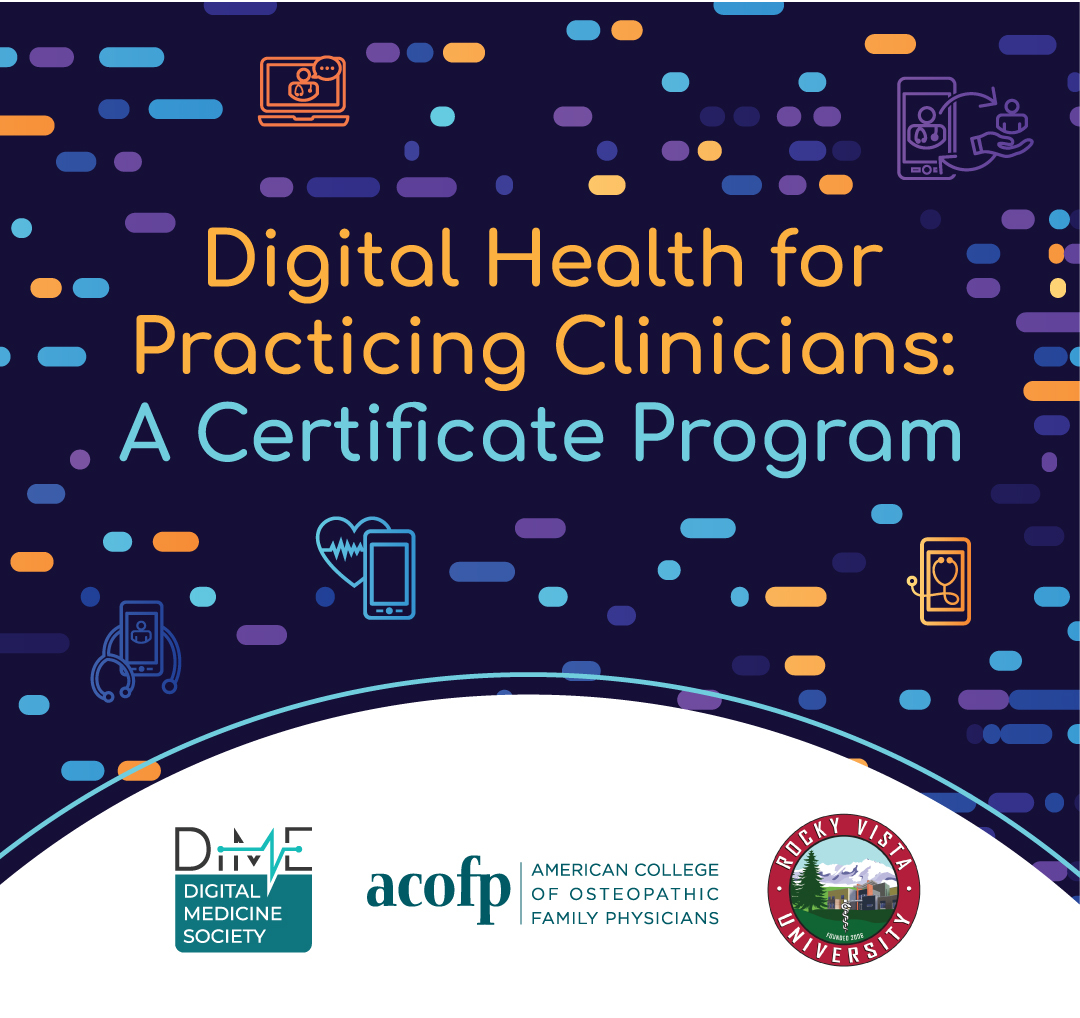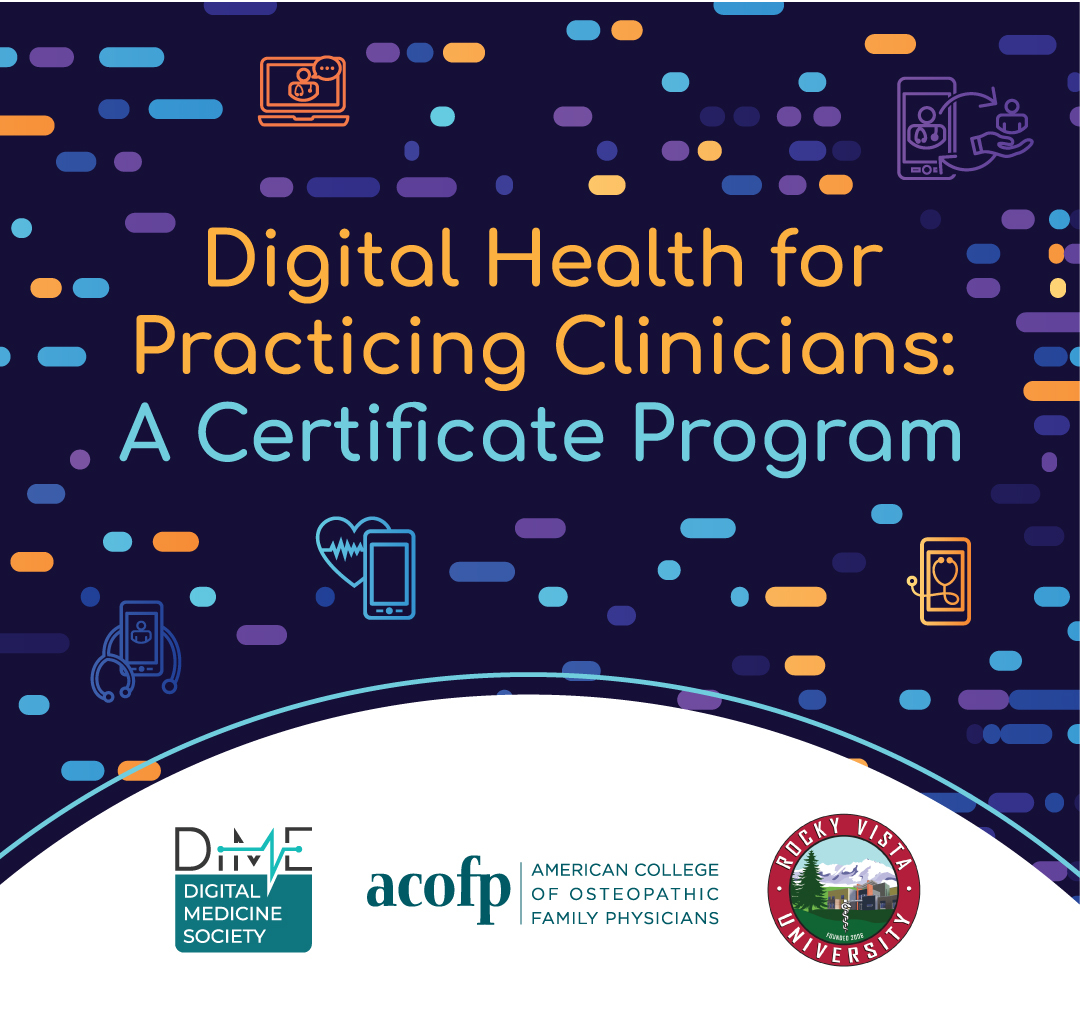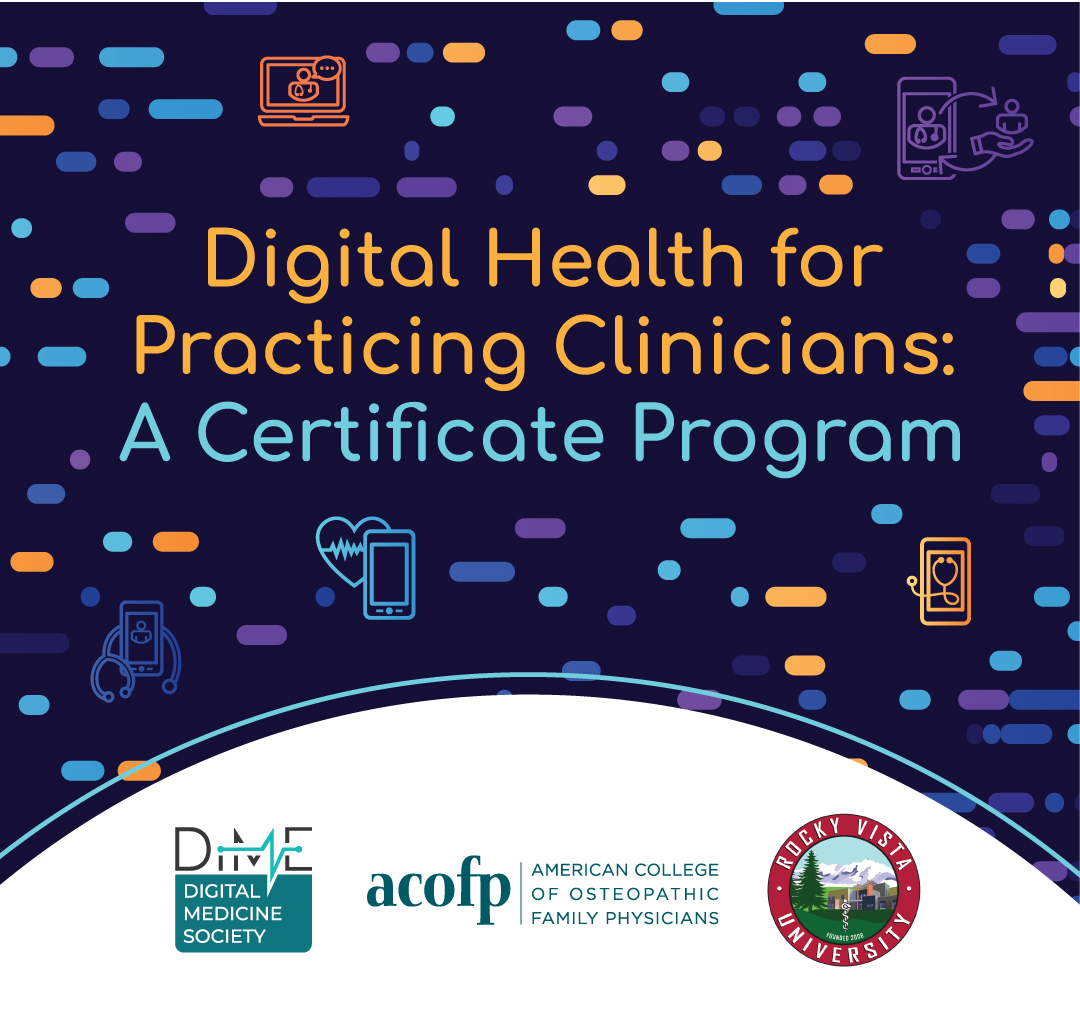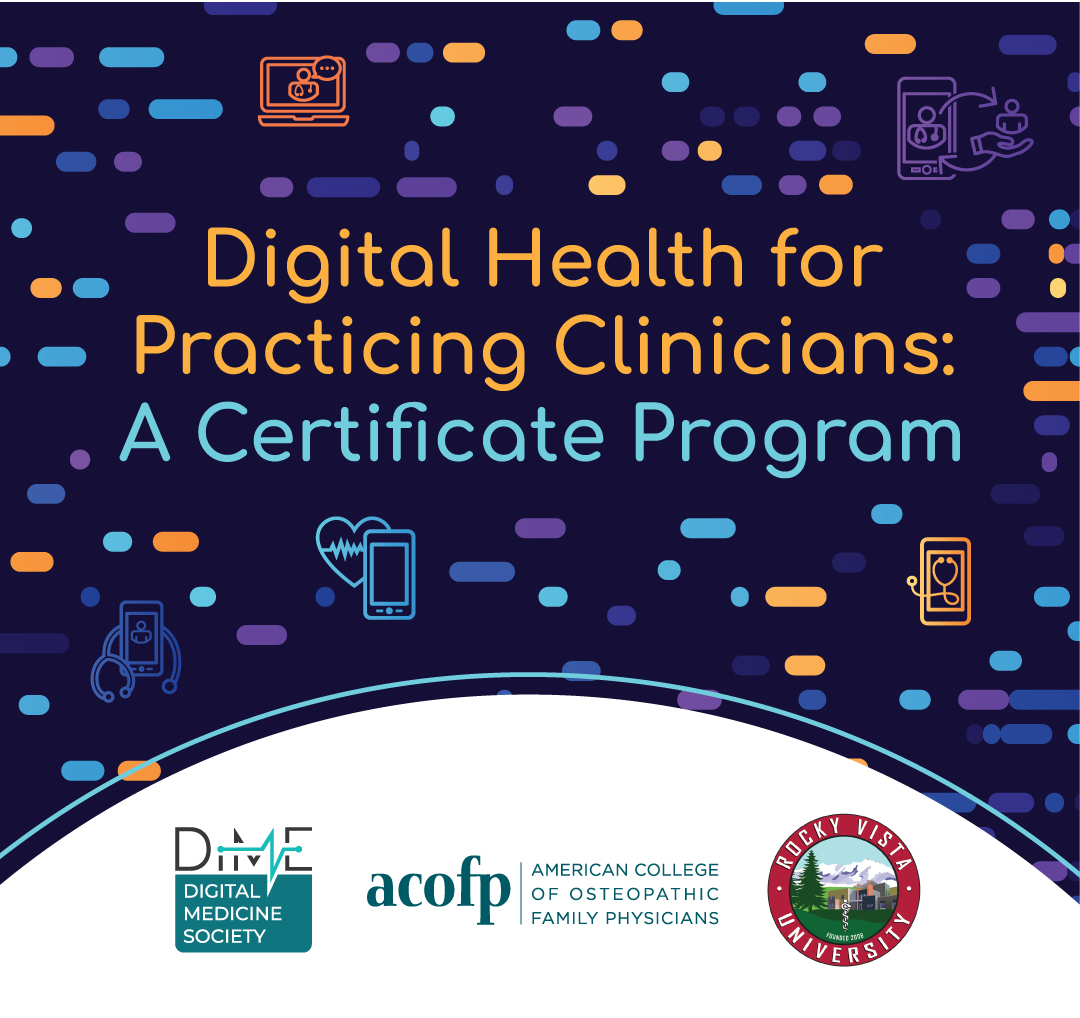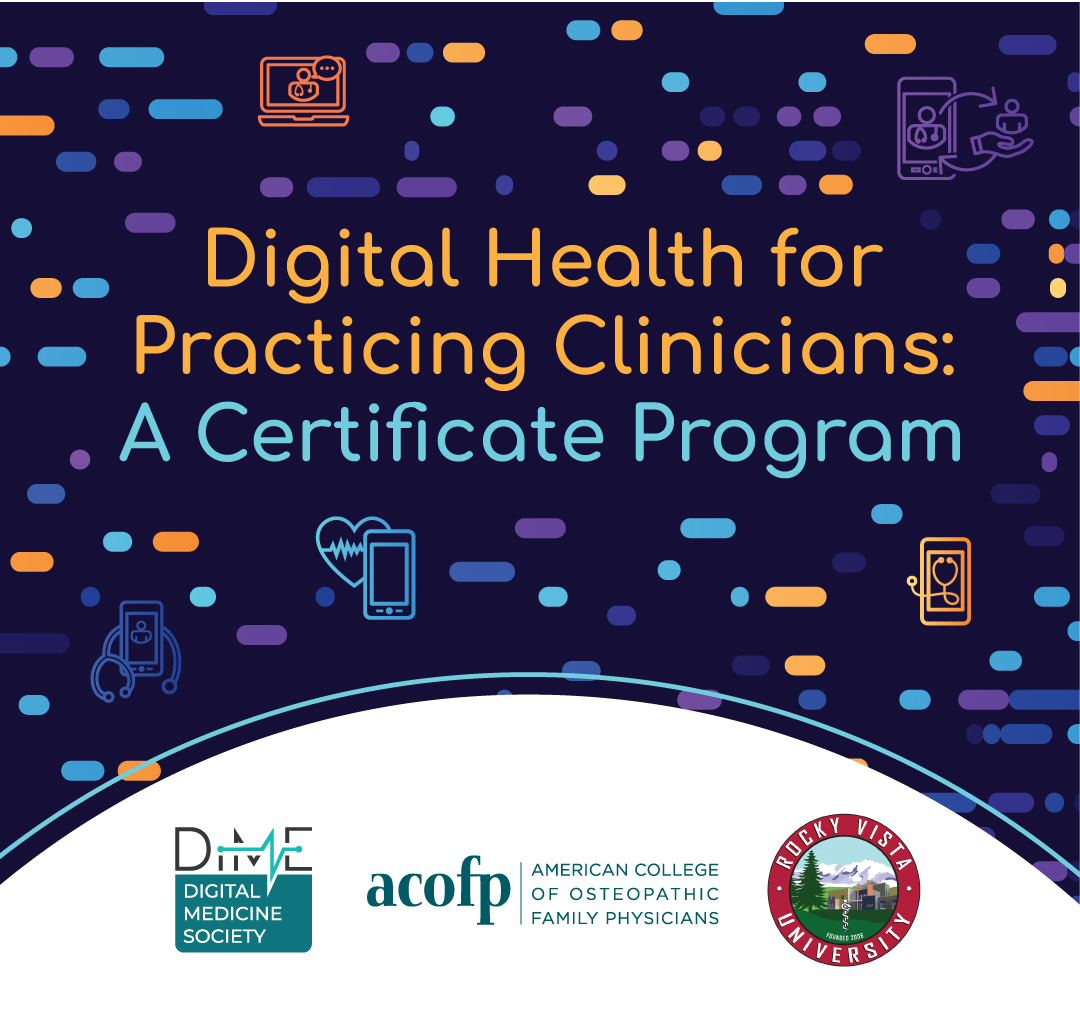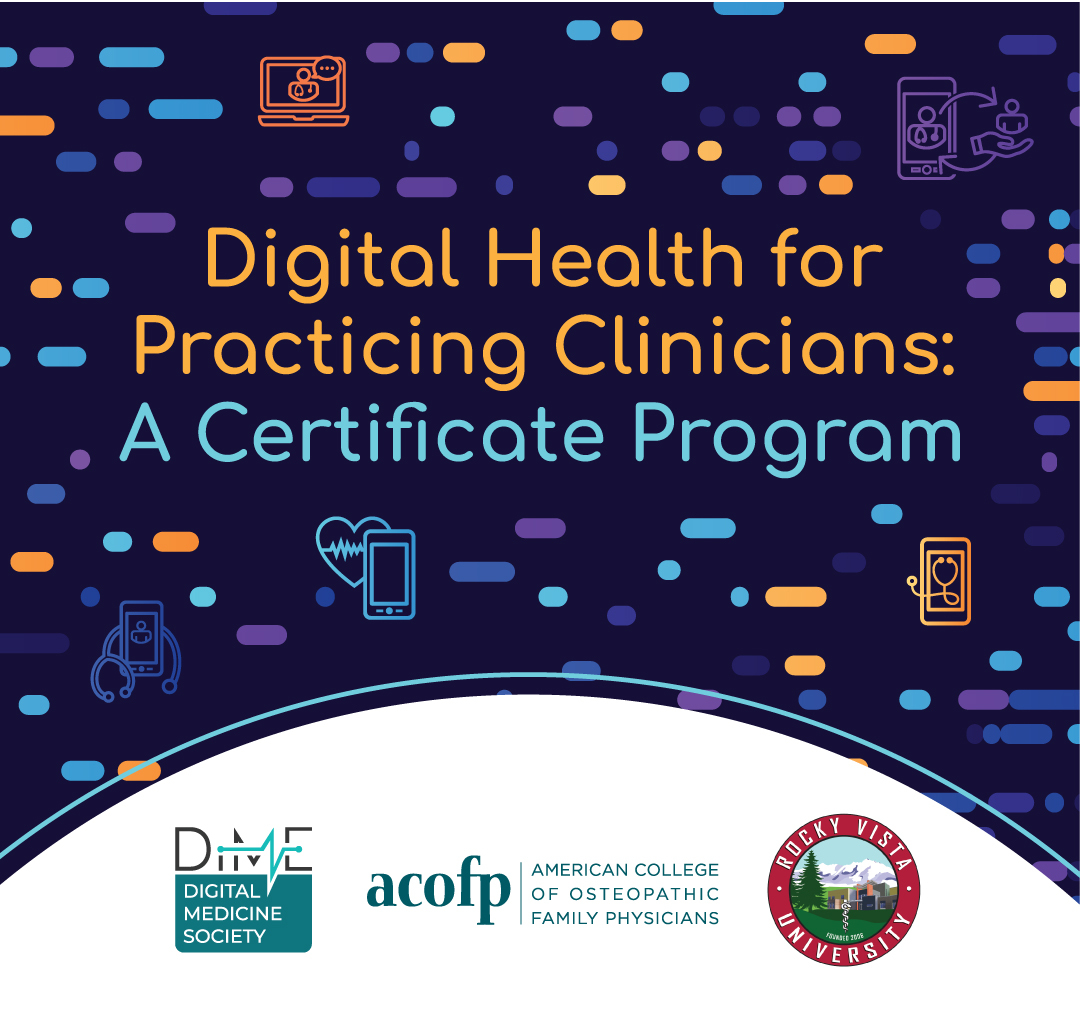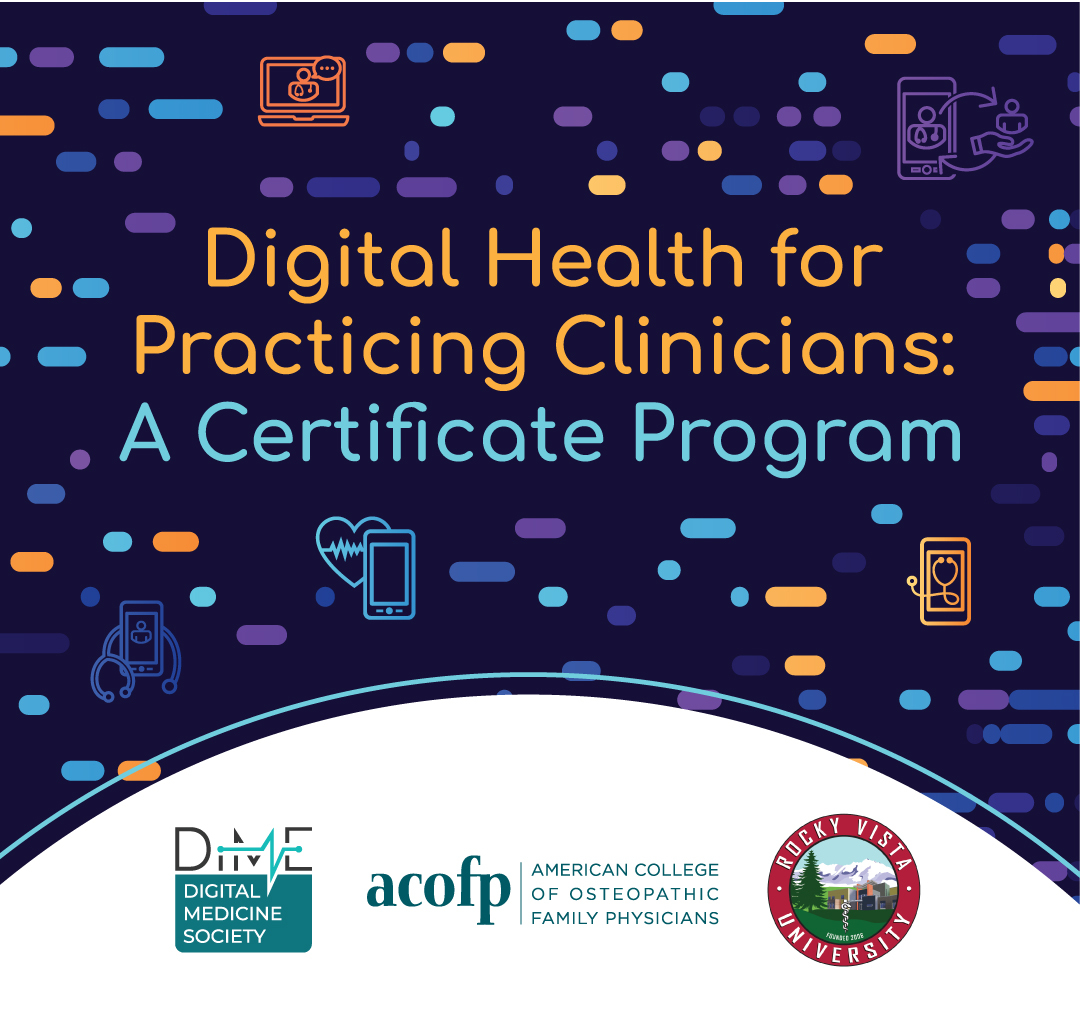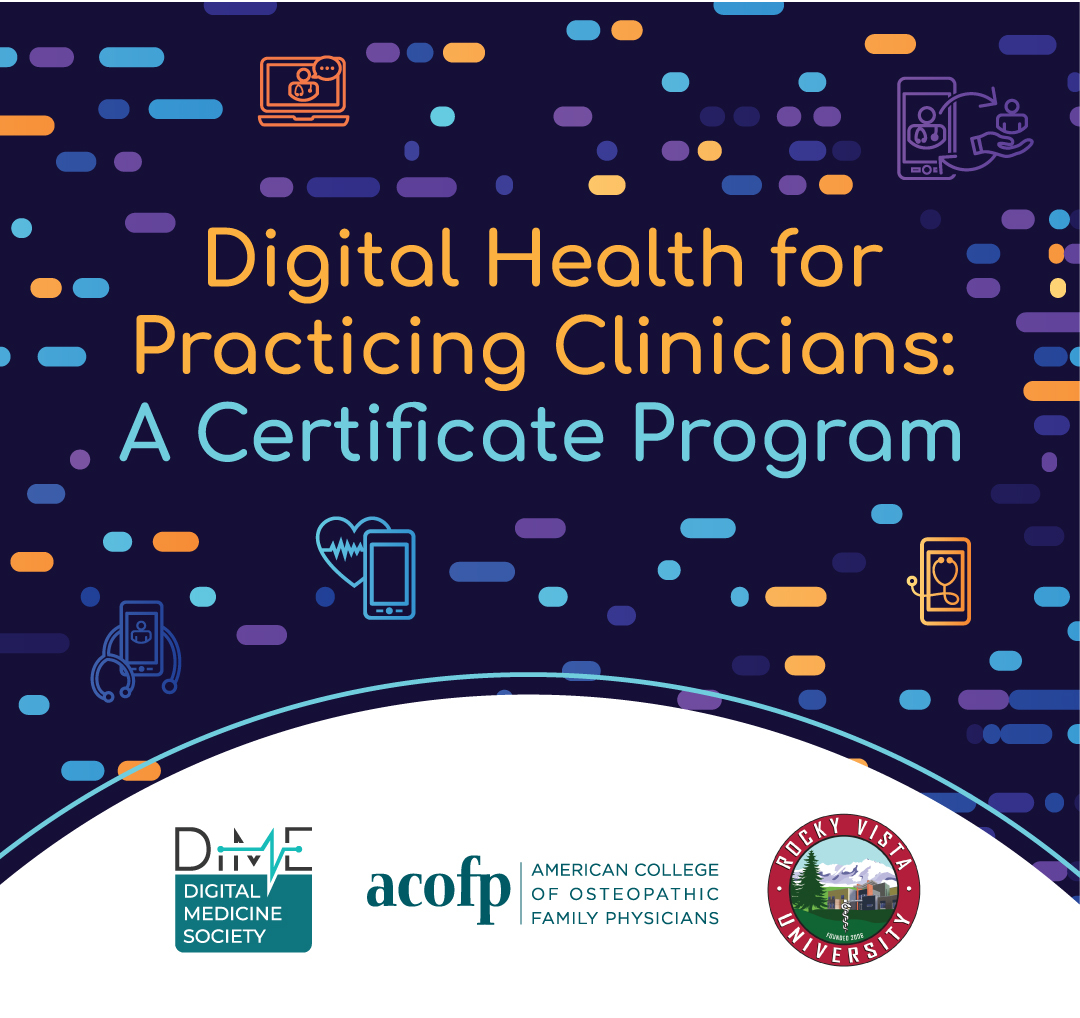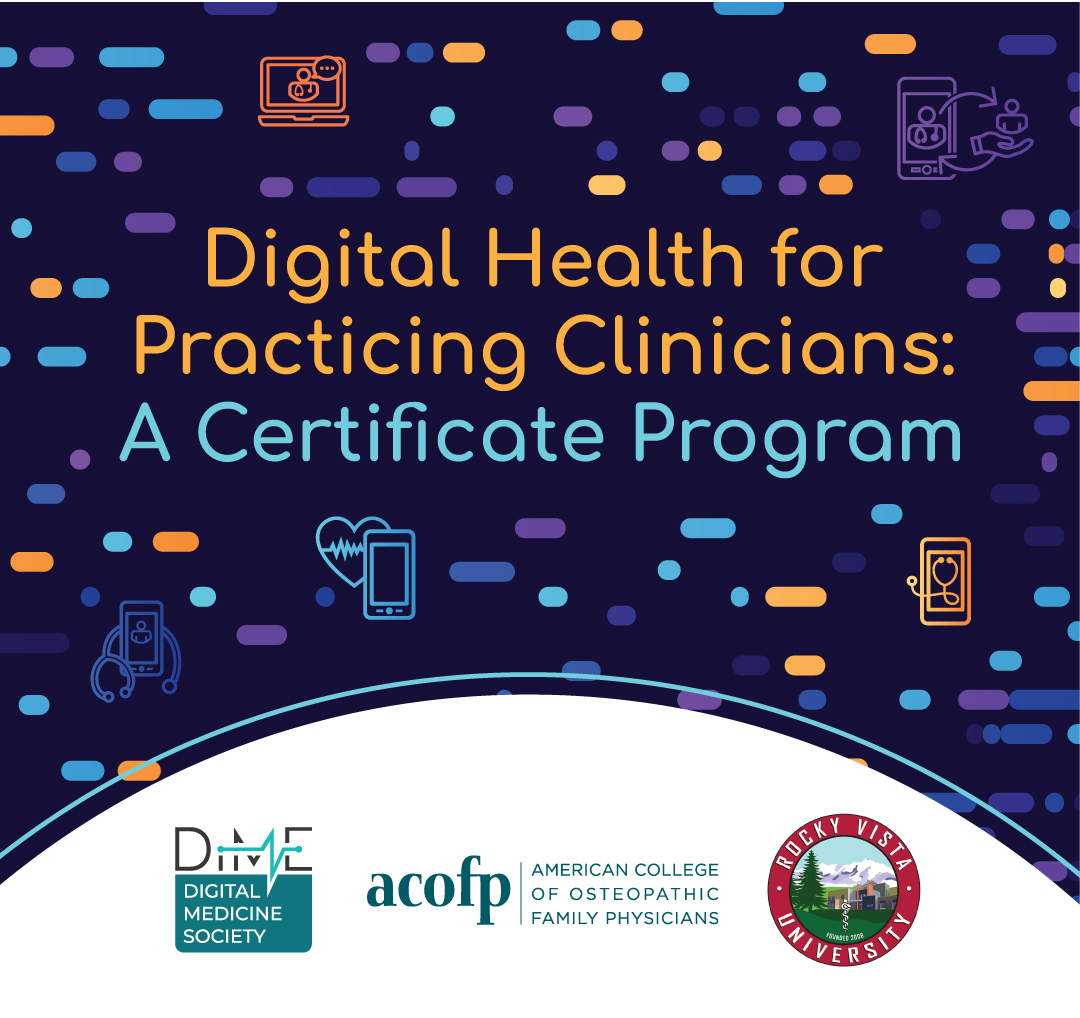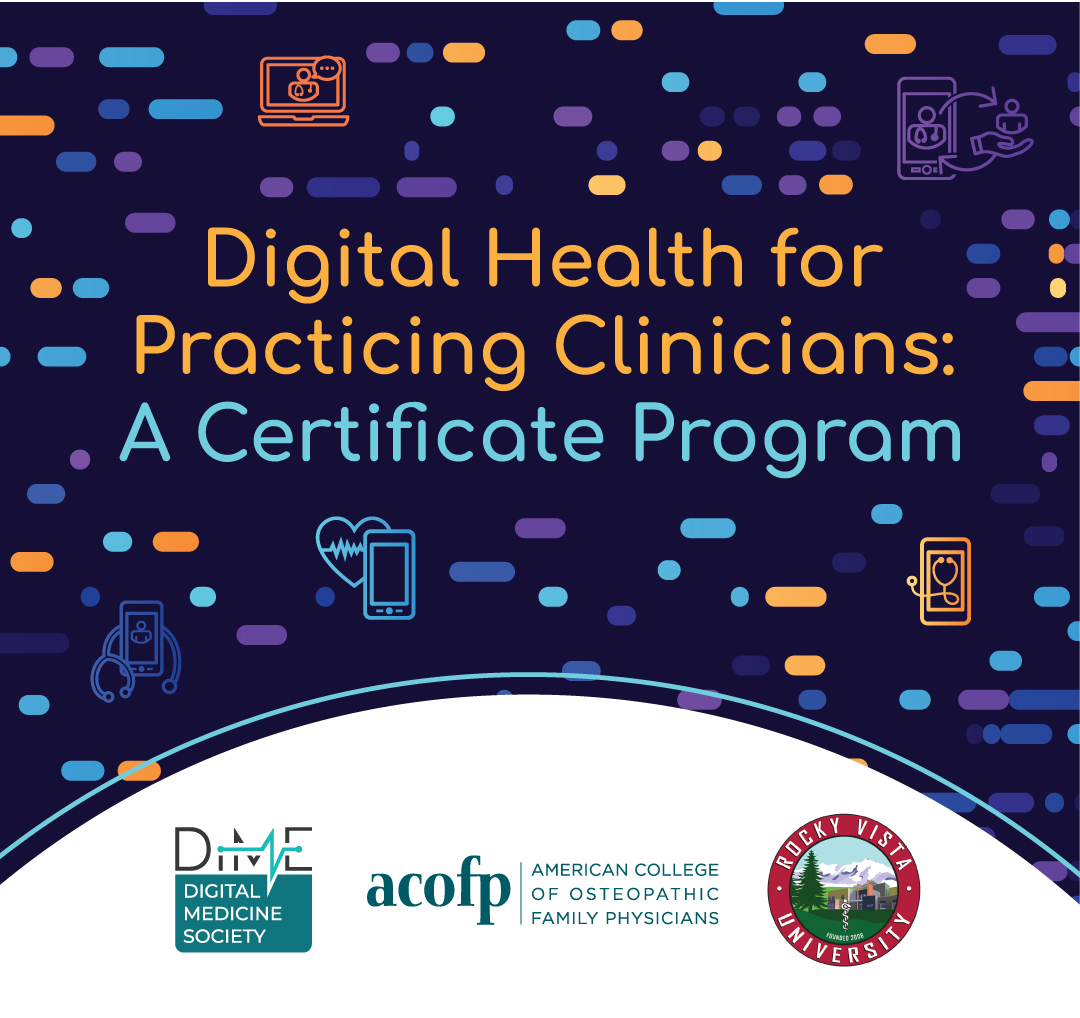
Catalog Advanced Search
-
Contains 3 Component(s)
Note: This education in not intended for any type of board certification but is instead as a supplemental education. By the end of this module, you should be able to: • Define the ‘digital divide’ and how it relates to social determinants of health • Understand how different patient segments access health technology and technology in general • Explore strategies for deploying health technology in a more accessible and equitable manner for patients at a clinic
Note: This education in not intended for any type of board certification but is instead as a supplemental education.
Thank you for registering for Digital Health for Practicing Clinicians: A Certificate Program. The Digital Medicine Society (DiMe) and Rocky Vista University College of Osteopathic Medicine - Digital Health Track (RVU-DHT), in collaboration with the American College of Osteopathic Family Physicians (ACOFP), has developed foundational educational content for the current and future practicing clinicians who provide exceptional care in the digital era of healthcare. Content creation was jointly guided by DiMe and RVU faculty and researched by students at RVU-DHT as some of the first physicians trained specifically in digital health.
Program Details
The Digital Medicine Society (DiMe) and Rocky Vista University College of Osteopathic Medicine - Digital Health Track (RVU-DHT) are partnering to develop foundational educational content for practicing clinicians towards providing exceptional care in the digital era of healthcare. Content creation is jointly guided by DiMe and RVU faculty and researched by students at RVU-DHT as some of the first physicians trained specifically in digital health.
The course will feature 8 modules, each with a pre- and post-test, as well as a final exam to test your knowledge and competency at the end of the course. The entire course, including the final exam, has 5.00 AOA Category 1-A CME available. Each module is expected to take around 30-40 minutes to complete for a total of approximately 5 contact hours plus the final exam.
You will repeat this for all 8 modules. Once you have completed all 8, you will have access to a comprehensive final exam covering content from all 8 modules. You must get a 70% or higher on this exam to obtain your certificate, and you will have three attempts. After successfully completing the exam, you will receive your certificate and access to various references and resources.
Module 7: Health Equity and Ethics in the Digital Age
Dr. Cole Zanetti, DO, MPH, Dr. Regan A. Stiegmann, DO, MPH and Dr. Smit Patel, PharmD along with Anjali Patel, Amy Pham, Sofia Rahmanzai, and Kendrick Rubino
By the end of this module, you should be able to:
- Define the ‘digital divide’ and how it relates to social determinants of health
- Understand how different patient segments access health technology and technology in general
- Explore strategies for deploying health technology in a more accessible and equitable manner for patients at a clinic
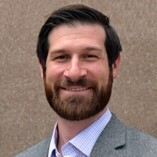
Cole A. Zanetti DO, MPH
Co-Director
Director of the Digital Health Track
Rocky Vista University
College of Osteopathic Medicine
Disclosures:
None

Regan A. Stiegmann DO, MPH
Co-Director
Co-Director of the Digital Health Track
Rocky Vista University
College of Osteopathic Medicine
Disclosures:
None

Smit Patel, PharmD
Director of Digital Medicine
Disclosures:
None
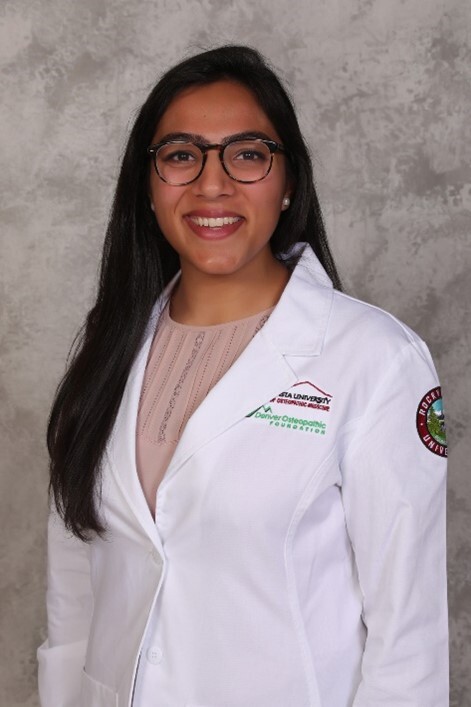
Anjali Patel
Medical Student
Anjali Patel (she/her) is originally from Evansville, IN and moved to Colorado in 2019 to pursue a master's in biomedical sciences at Rocky Vista University College of Osteopathic Medicine. She is currently a 2nd year medical student at RVU-COM, where she is a proud member of the Digital Health Track. Anjali has served as Vice President of the American Medical Women’s Association and as the Community Service chair for the American College of Osteopathic Pediatricians clubs during her time at RVU. Additionally, she works as an anatomy lab tutor for 1st year students and is a member of Sigma Sigma Phi Osteopathic Medical Honor society. In her free time, she enjoys hiking and going to concerts
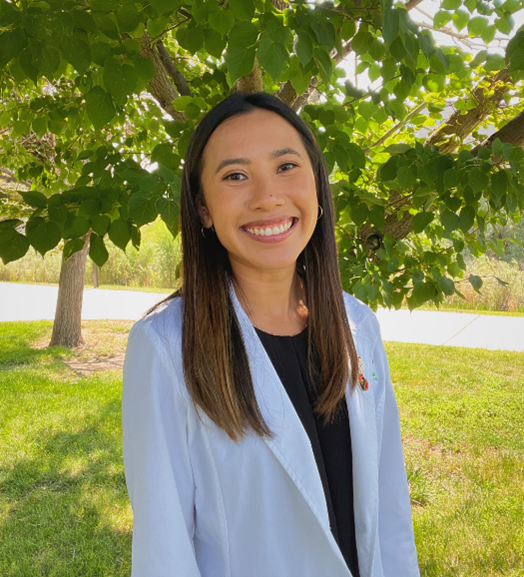
Amy Pham
Medical Student
Amy Pham is a current second-year medical student at Rocky Vista University. Originally from Wichita, KS she graduated with honors from Wichita State University with a BS in Chemistry and BA in French in 2019, and from Colorado State University with an MS in Biomedical Sciences in 2020. Amy represents Rocky Vista University as part of the Class of 2024 cohort of the Digital Health Honors Track and has been engaged with first-year medical students as a tutor in the cardiovascular and neuroscience systems courses. She can speak 3 languages and enjoys spending her free time learning new languages and “traveling from home” by immersing herself in foreign film, music and literature, and cooking dishes from around the world.

Sofia Rahmanzai
Medical Student
Sofia Rahmanzai (she/her) is originally from Omaha, Nebraska, where she gained her BS in Biotechnology at the University of Nebraska. She moved to Colorado in 2019 to attend Rocky Vista University’s Master of Biomedical Sciences, followed by the College of Osteopathic Medical Program. In her second year of medical school, Sofia stays busy with the Digital Health Track, the Physical Medicine and Rehabilitation Club as a secretary, and various volunteer opportunities including administering COVID vaccines at the RVU clinic. Some of Sofia’s interests include playing volleyball, weekend trips, and designing a digital health tool app with her DHT colleagues.
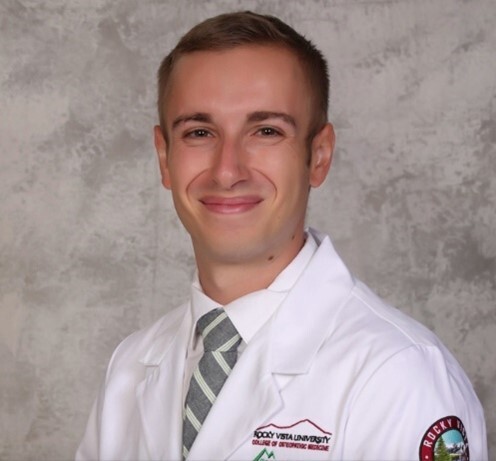
Kendrick Rubino
Medical Student
Kendrick Rubino is from New Hampshire and is currently a second-year medical student at Rocky Vista University out in Colorado. Kendrick is also part of my medical school's digital health track which is the first program of its kind to be implemented into a medical school's curriculum. Kendrick joined this track because he believes Digital Health is the future of medicine and can have far reaching positive impacts in our health care systems and with our patients.
-
Register
- Non-member - Free!
- Member - Free!
- Resident/Fellow - Free!
- Student - Free!
- More Information
-
Contains 3 Component(s)
Note: This education in not intended for any type of board certification but is instead as a supplemental education. By the end of this module, you should be able to: • Describe the ethical considerations of digital health providers • Effectively communicate health technology to patients • Understand strategies for collaborating with patients regarding health technology
Note: This education in not intended for any type of board certification but is instead as a supplemental education.
Thank you for registering for Digital Health for Practicing Clinicians: A Certificate Program. The Digital Medicine Society (DiMe) and Rocky Vista University College of Osteopathic Medicine - Digital Health Track (RVU-DHT), in collaboration with the American College of Osteopathic Family Physicians (ACOFP), has developed foundational educational content for the current and future practicing clinicians who provide exceptional care in the digital era of healthcare. Content creation was jointly guided by DiMe and RVU faculty and researched by students at RVU-DHT as some of the first physicians trained specifically in digital health.
Program Details
The Digital Medicine Society (DiMe) and Rocky Vista University College of Osteopathic Medicine - Digital Health Track (RVU-DHT) are partnering to develop foundational educational content for practicing clinicians towards providing exceptional care in the digital era of healthcare. Content creation is jointly guided by DiMe and RVU faculty and researched by students at RVU-DHT as some of the first physicians trained specifically in digital health.
The course will feature 8 modules, each with a pre- and post-test, as well as a final exam to test your knowledge and competency at the end of the course. The entire course, including the final exam, has 5.00 AOA Category 1-A CME available. Each module is expected to take around 30-40 minutes to complete for a total of approximately 5 contact hours plus the final exam.
You will repeat this for all 8 modules. Once you have completed all 8, you will have access to a comprehensive final exam covering content from all 8 modules. You must get a 70% or higher on this exam to obtain your certificate, and you will have three attempts. After successfully completing the exam, you will receive your certificate and access to various references and resources.
Module 6: Patient Advocacy in Digital Health
Dr. Cole Zanetti, DO, MPH, Dr. Regan A. Stiegmann, DO, MPH and Dr. Smit Patel, PharmD along with Samantha Santora, Danica Cecil Ujano, Austin G. White, and Jasmine Yu
By the end of this module, you should be able to:
- Describe the ethical considerations of digital health providers
- Effectively communicate health technology to patients
- Understand strategies for collaborating with patients regarding health technology

Cole A. Zanetti DO, MPH
Co-Director
Director of the Digital Health Track
Rocky Vista University
College of Osteopathic Medicine
Disclosures:
None

Regan A. Stiegmann DO, MPH
Co-Director
Co-Director of the Digital Health Track
Rocky Vista University
College of Osteopathic Medicine
Disclosures:
None

Smit Patel, PharmD
Director of Digital Medicine
Disclosures:
None

Samantha Santora
Medical Student
Samantha Santora is a second-year medical student at Rocky Vista University College of Osteopathic Medicine. She graduated from University of North Texas Honors College with a Bachelor of Art in Biology with a dual minor in Chemistry and Psychology. She previously completed her EMT certification and volunteered with her community’s free clinic, as well as volunteered within her local hospital’s Labor and Delivery ward. She currently is a member of the RVUCOM Digital Health Honors Track, member of the RVU Chapter of American College of Osteopathic Emergency Physicians, Co-President of the RVU chapter of Colorado Medical Society, and Community Outreach Coordinator for the RVU chapter of American College of Osteopathic Surgeons-Medical Student Section. Her academic interests include committing to lifelong education, mentoring medical and pre-medical students, ensuring quality, accessible care for all, and utilizing digital medicine technologies to benefit physicians and improve patient care.

Danica Cecil Ujano
Medical Student
Danica Cecil Ujano is a student at Rocky Vista University College of Osteopathic Medicine in Colorado. She graduated with her BSN from Lewis University in 2015 and shortly after, obtained her license as a registered nurse. While providing care to diverse patient populations across the lifespan in the Chicago area, she explored her interest in clinical research and STEM. In 2019, she graduated with a BA in Biomedical Sciences at Lewis University. As part of the Digital Health Track at RVU, Danica Cecil is a co-author to continuing education modules, conference presentations, and research studies aimed at improving physician-patient communication in a digital era. After graduation, Danica Cecil hopes to pursue a career in radiology or clinical informatics with a focus on artificial intelligence technology and machine learning.
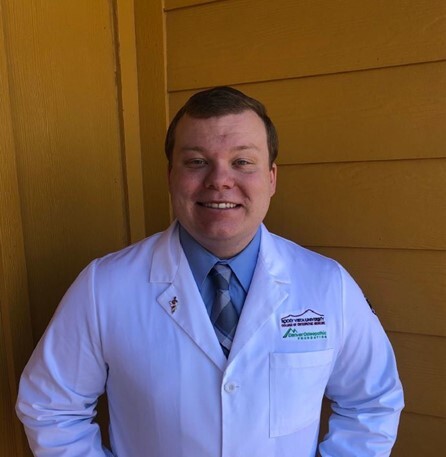
Austin G. White
Medical Student
Austin G. White is a second-year medical student at Rocky Vista University in Colorado. Austin studied Biochemistry in his undergraduate education and also obtained a Master of Science in Biomedical Sciences before medical school. His interests include the implementation of digital medicine, family medicine, obstetrics and neonatal medicine. Austin participated in the DiMe CME module to further his understanding of how a working physician could use technology to improve patient outcomes.
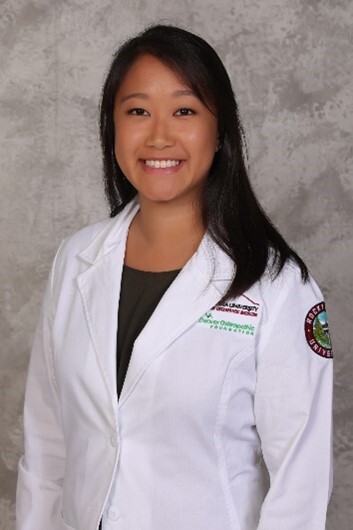
Jasmine Yu
Medical Student
Jasmine Yu, MS is an OMS-II student at Rocky Vista University College of Osteopathic Medicine. She is part of the Digital Health Honors Track, the first and only longitudinal program dedicated to additional digital health training for student physicians. Prior to medical school, she received her master’s degree in biomedical science at Eastern Virginia Medical School. Her current research interests focus on improving medical education curriculum, enhancing student communication skills through improv, as well as evaluating substance use trends pre- and peri- COVID.
-
Register
- Non-member - Free!
- Member - Free!
- Resident/Fellow - Free!
- Student - Free!
- More Information
-
Contains 3 Component(s)
Note: This education in not intended for any type of board certification but is instead as a supplemental education. By the end of this module, you should be able to: • Understand the definitions and examples of consumer health informatics and its applications • Demonstrate an understanding of how patient-generated health data is used by providers • Identify the roles of providers in the field of consumer health informatics
Note: This education in not intended for any type of board certification but is instead as a supplemental education.
Thank you for registering for Digital Health for Practicing Clinicians: A Certificate Program. The Digital Medicine Society (DiMe) and Rocky Vista University College of Osteopathic Medicine - Digital Health Track (RVU-DHT), in collaboration with the American College of Osteopathic Family Physicians (ACOFP), has developed foundational educational content for the current and future practicing clinicians who provide exceptional care in the digital era of healthcare. Content creation was jointly guided by DiMe and RVU faculty and researched by students at RVU-DHT as some of the first physicians trained specifically in digital health.
Program Details
The Digital Medicine Society (DiMe) and Rocky Vista University College of Osteopathic Medicine - Digital Health Track (RVU-DHT) are partnering to develop foundational educational content for practicing clinicians towards providing exceptional care in the digital era of healthcare. Content creation is jointly guided by DiMe and RVU faculty and researched by students at RVU-DHT as some of the first physicians trained specifically in digital health.
The course will feature 8 modules, each with a pre- and post-test, as well as a final exam to test your knowledge and competency at the end of the course. The entire course, including the final exam, has 5.00 AOA Category 1-A CME available. Each module is expected to take around 30-40 minutes to complete for a total of approximately 5 contact hours plus the final exam.
You will repeat this for all 8 modules. Once you have completed all 8, you will have access to a comprehensive final exam covering content from all 8 modules. You must get a 70% or higher on this exam to obtain your certificate, and you will have three attempts. After successfully completing the exam, you will receive your certificate and access to various references and resources.
Module 5: Consumer Health Informatics (CHI)
Dr. Cole Zanetti, DO, MPH, Dr. Regan A. Stiegmann, DO, MPH and Dr. Smit Patel, PharmD along with Ali Coffee (Koehler), Jackson Holmgren, Meghana Kethireddy, and Matthew Tepper
By the end of this module, you should be able to:
- Understand the definitions and examples of consumer health informatics and its applications
- Demonstrate an understanding of how patient-generated health data is used by providers
- Identify the roles of providers in the field of consumer health informatics

Cole A. Zanetti DO, MPH
Co-Director
Director of the Digital Health Track
Rocky Vista University
College of Osteopathic Medicine
Disclosures:
None

Regan A. Stiegmann DO, MPH
Co-Director
Co-Director of the Digital Health Track
Rocky Vista University
College of Osteopathic Medicine
Disclosures:
None

Smit Patel, PharmD
Director of Digital Medicine
Disclosures:
None
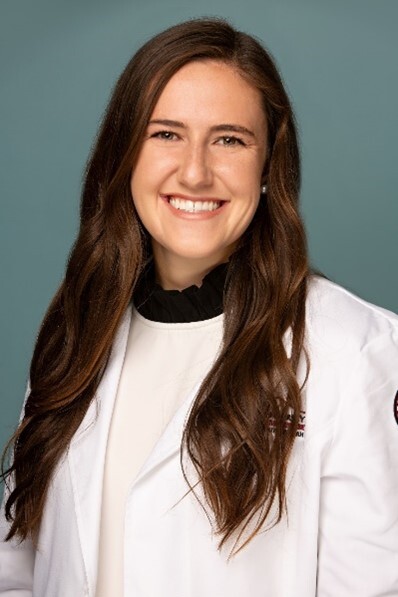
Ali Koehler Coffee
Medical Student
Ali Koehler Coffee is a third-year medical student at Rocky Vista College of Osteopathic Medicine (RVUCOM). She graduated from Saint Martin’s University in Lacey, Washington with a Bachelor of Science in Chemistry where she was a dual-sport Division II athlete in soccer and golf. Prior to medical school, Ali worked at PRA Health Sciences as medical research assistant and volunteered at her hometown’s free medical clinic. She is a member of the RVUCOM Digital Health track, a member of the American College of Pediatrics, and a member of the American College of Lifestyle Medicine. Her academic interests include educating and motivating patients to take control of their health through healthy lifestyle choices such as diet, exercise, stress reduction and utilizing digital medicine technologies to benefit physicians and improve patient care.

Jackson Holmgren
Medical Student
Jackson is a medical student at Rocky Vista University College of Osteopathic Medicine-Southern Utah Campus.
His is originally from Kansas and his hobbies include fly fishing, mountain bike riding, backpacking, and photography. Professionally, Jackson is interested in various medical specialties and look forward to continuing his education.
He has a large interest in the world of Digital Medicine. Jackson is specifically interested in the field of Clinical Informatics and how utilizing novel digital medicine technologies can improve access to care in rural setting.

Meghana Kethireddy
Medical Student
Meghana Kethireddy is a second-year medical student at Rocky Vista University College of Osteopathic Medicine (RVUCOM). She graduated from Nova Southeastern University in Fort Lauderdale, Florida with a Bachelor of Science in Biology. During her undergraduate career she served as a student research assistant at the Rumbaugh-Goodwin Institute for Cancer Research and presented research at the Life Sciences STEM Regional Conference. She is a member of RVUCOM’s Digital Health track and a member of the American College of Physicians (ACP). Her current interests in the realm of digital health include the advancement of clinical informatics to improve physician efficiency and patient outcomes as well as measuring the efficacy of wearables to provide patients with more control of their health. Apart from Digital health, her academic interests include internal medicine and ultrasonography.
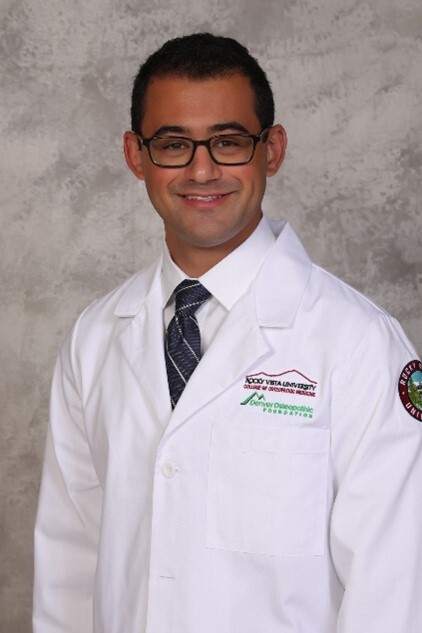
Matthew Tepper
Medical Student
Matt Tepper is originally from Philadelphia, PA. He graduated from Ohio State University in 2018 with a degree in economics and a minor in biology. During his time at college, Matt interned at a health technology start up in Tel Aviv, which introduced him to the field of digital health. Matt is currently a medical student at Rocky Vista University College of Osteopathic Medicine class of 2024 in the digital health track. While he is still undecided on a specialty, Matt plans to incorporate his knowledge of digital health into whichever route he pursues. When he is not studying, Matt enjoys skiing and rooting for Philadelphia and Ohio State sports teams.
-
Register
- Non-member - Free!
- Member - Free!
- Resident/Fellow - Free!
- Student - Free!
- More Information
-
Contains 3 Component(s)
Note: This education in not intended for any type of board certification but is instead as a supplemental education. By the end of this module, you should be able to: • Understand the basic fundamentals of Artificial intelligence • Recognize the concepts of AI and its relation to healthcare technology • Describe the role of AI to augment care delivery for patients • Identify associated financial, legal, and ethical considerations
Note: This education in not intended for any type of board certification but is instead as a supplemental education.
Thank you for registering for Digital Health for Practicing Clinicians: A Certificate Program. The Digital Medicine Society (DiMe) and Rocky Vista University College of Osteopathic Medicine - Digital Health Track (RVU-DHT), in collaboration with the American College of Osteopathic Family Physicians (ACOFP), has developed foundational educational content for the current and future practicing clinicians who provide exceptional care in the digital era of healthcare. Content creation was jointly guided by DiMe and RVU faculty and researched by students at RVU-DHT as some of the first physicians trained specifically in digital health.
Program Details
The Digital Medicine Society (DiMe) and Rocky Vista University College of Osteopathic Medicine - Digital Health Track (RVU-DHT) are partnering to develop foundational educational content for practicing clinicians towards providing exceptional care in the digital era of healthcare. Content creation is jointly guided by DiMe and RVU faculty and researched by students at RVU-DHT as some of the first physicians trained specifically in digital health.
The course will feature 8 modules, each with a pre- and post-test, as well as a final exam to test your knowledge and competency at the end of the course. The entire course, including the final exam, has 5.00 AOA Category 1-A CME available. Each module is expected to take around 30-40 minutes to complete for a total of approximately 5 contact hours plus the final exam.
You will repeat this for all 8 modules. Once you have completed all 8, you will have access to a comprehensive final exam covering content from all 8 modules. You must get a 70% or higher on this exam to obtain your certificate, and you will have three attempts. After successfully completing the exam, you will receive your certificate and access to various references and resources.
Module 2: Evaluating Frameworks for Selecting Digital Technologies for Patients and Clinics
Dr. Cole Zanetti, DO, MPH, Dr. Regan A. Stiegmann, DO, MPH and Dr. Smit Patel, PharmD along with Kamaehu Matthias, Jason Steele, Kenny Ta, Austin B. White, and Robert Cameron Green
By the end of this module, you should be able to:
- Understand the basic fundamentals of Artificial intelligence
- Recognize the concepts of AI and its relation to healthcare technology
- Describe the role of AI to augment care delivery for patients
- Identify associated financial, legal, and ethical considerations

Cole A. Zanetti DO, MPH
Co-Director
Director of the Digital Health Track
Rocky Vista University
College of Osteopathic Medicine
Disclosures:
None

Regan A. Stiegmann DO, MPH
Co-Director
Co-Director of the Digital Health Track
Rocky Vista University
College of Osteopathic Medicine
Disclosures:
None

Smit Patel, PharmD
Director of Digital Medicine
Disclosures:
None
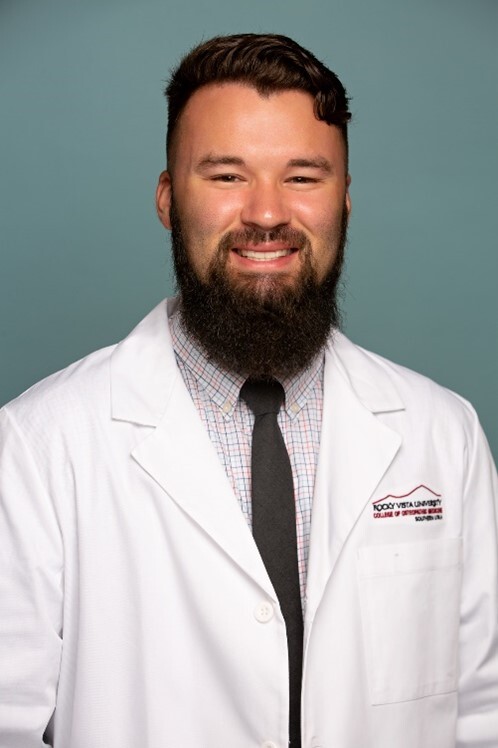
Kamaehu Matthias
Medical Student
Kamaehu Matthias is a student from Rocky Vista University College of Osteopathic Medicine – Southern Utah. He graduated from Utah State University with a BS in Biology. His interest in digital health stems from his undergraduate research in leveraging mobile technologies in learning environments. The Digital Health Track at RVU has offered him a new approach to technology and how it can improve patient outcomes while also offering providers a new tool to improve workflow efficiency. He is pursuing a career in sports medicine and is excited to bring an informed perspective and acceptance of digital health technologies into everyday practice.
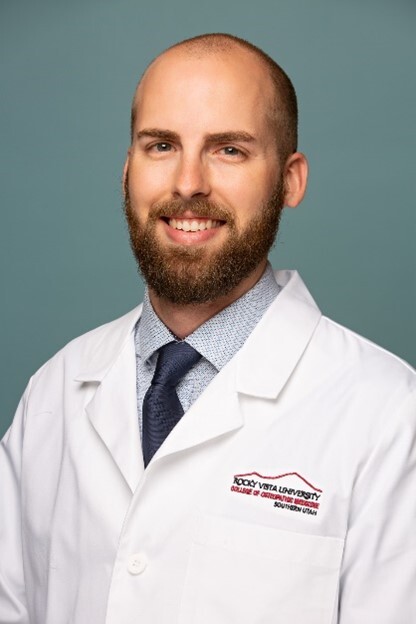
Jason Steele
Medical Student
Jason L. Steele was born and raised in Salt Lake City, Utah, and since then has lived in Ecuador, Virginia, Texas, and now St. George, Utah. He graduated from Brigham Young University – Provo, with a Bachelor of Science in Neuroscience with a dual major in Spanish Studies. Shortly after graduating, he received his Certified Healthcare Interpreter™ credential for the Spanish language.
Currently, he is a medical student at Rocky Vista University College of Osteopathic Medicine (RVUCOM) – Southern Utah Campus.
As a member of RVUCOM’s Digital Health Track, Jason is establishing himself with a focus in the medical application of artificial intelligence, machine learning, and data analytics. He plans to incorporate these learned skills and interests throughout his medical training. Upon graduating from medical school, he plans to pursue a career in Otolaryngology.
Jason is active in various sporting and recreational activities including biking, playing soccer, and spending time outdoors with his wife and children.
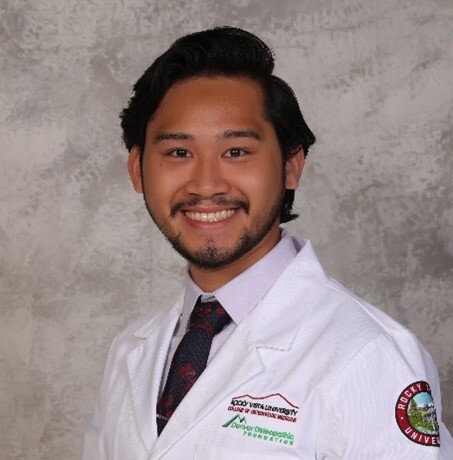
Kenny Ta
Medical Student
Kenny Ta, born in 1994, graduated from the University of Texas at Dallas with a BS in Biology. He is now a student at Rocky Vista University College of Osteopathic Medicine – Colorado, class of 2024. Kenny's interest in computer science and ultrasound technology led him to join the Digital Health Track, the first 4-year program of its kind offered by a United States medical school. After graduating, Kenny plans to pursue a residency in Emergency Medicine and a fellowship in Critical Care.
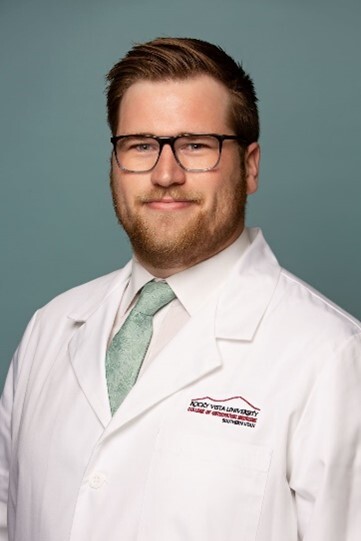
Austin B. White
Medical Student
Austin B. White is a student at Rocky Vista University College of Osteopathic Medicine – Southern Utah Campus. He graduated from Weber State University in Ogden, Utah with a BS in zoology. His interest in osteopathic medicine stems from a pursuit of non-pharmacological methods of pain management. As part of Rocky Vista University’s digital health track, he plans to investigate new applications of technology into family and psychiatric medicine. After graduating medical school, Austin plans to pursue a residency in family medicine.

Robert Cameron Green
Medical Student
-
Register
- Non-member - Free!
- Member - Free!
- Resident/Fellow - Free!
- Student - Free!
- More Information
-
Contains 3 Component(s)
Note: This education in not intended for any type of board certification but is instead as a supplemental education. By the end of this module, you should be able to: • Provide a basic overview of reimbursement structure for telehealth • Identify cultural and socioeconomic considerations in telemedicine to ensure health equality for all patients • Understand best practices for clinicians to deliver care virtually with the new modalities of digital tools to enhance digital delivery of healthcare
Note: This education in not intended for any type of board certification but is instead as a supplemental education.
Thank you for registering for Digital Health for Practicing Clinicians: A Certificate Program. The Digital Medicine Society (DiMe) and Rocky Vista University College of Osteopathic Medicine - Digital Health Track (RVU-DHT), in collaboration with the American College of Osteopathic Family Physicians (ACOFP), has developed foundational educational content for the current and future practicing clinicians who provide exceptional care in the digital era of healthcare. Content creation was jointly guided by DiMe and RVU faculty and researched by students at RVU-DHT as some of the first physicians trained specifically in digital health.
Program Details
The Digital Medicine Society (DiMe) and Rocky Vista University College of Osteopathic Medicine - Digital Health Track (RVU-DHT) are partnering to develop foundational educational content for practicing clinicians towards providing exceptional care in the digital era of healthcare. Content creation is jointly guided by DiMe and RVU faculty and researched by students at RVU-DHT as some of the first physicians trained specifically in digital health.
The course will feature 8 modules, each with a pre- and post-test, as well as a final exam to test your knowledge and competency at the end of the course. The entire course, including the final exam, has 5.00 AOA Category 1-A CME available. Each module is expected to take around 30-40 minutes to complete for a total of approximately 5 contact hours plus the final exam.
You will repeat this for all 8 modules. Once you have completed all 8, you will have access to a comprehensive final exam covering content from all 8 modules. You must get a 70% or higher on this exam to obtain your certificate, and you will have three attempts. After successfully completing the exam, you will receive your certificate and access to various references and resources.
Module 3: Best Practices for Telemedicine
Dr. Cole Zanetti, DO, MPH, Dr. Regan A. Stiegmann, DO, MPH and Dr. Smit Patel, PharmD along with Samantha Santora, Danica C. Ujano, Austin G. White, and Jasmine Yu
By the end of this module, you should be able to:
- Provide a basic overview of reimbursement structure for telehealth
- Identify cultural and socioeconomic considerations in telemedicine to ensure health equality for all patients
- Understand best practices for clinicians to deliver care virtually with the new modalities of digital tools to enhance digital delivery of healthcare

Cole A. Zanetti DO, MPH
Co-Director
Director of the Digital Health Track
Rocky Vista University
College of Osteopathic Medicine
Disclosures:
None

Regan A. Stiegmann DO, MPH
Co-Director
Co-Director of the Digital Health Track
Rocky Vista University
College of Osteopathic Medicine
Disclosures:
None

Smit Patel, PharmD
Director of Digital Medicine
Disclosures:
None

Samantha Santora
Medical Student
Samantha Santora is a second-year medical student at Rocky Vista University College of Osteopathic Medicine. She graduated from University of North Texas Honors College with a Bachelor of Art in Biology with a dual minor in Chemistry and Psychology. She previously completed her EMT certification and volunteered with her community’s free clinic, as well as volunteered within her local hospital’s Labor and Delivery ward. She currently is a member of the RVUCOM Digital Health Honors Track, member of the RVU Chapter of American College of Osteopathic Emergency Physicians, Co-President of the RVU chapter of Colorado Medical Society, and Community Outreach Coordinator for the RVU chapter of American College of Osteopathic Surgeons-Medical Student Section. Her academic interests include committing to lifelong education, mentoring medical and pre-medical students, ensuring quality, accessible care for all, and utilizing digital medicine technologies to benefit physicians and improve patient care.

Danica Cecil Ujano
Medical Student
Danica Cecil Ujano is a student at Rocky Vista University College of Osteopathic Medicine in Colorado. She graduated with her BSN from Lewis University in 2015 and shortly after, obtained her license as a registered nurse. While providing care to diverse patient populations across the lifespan in the Chicago area, she explored her interest in clinical research and STEM. In 2019, she graduated with a BA in Biomedical Sciences at Lewis University. As part of the Digital Health Track at RVU, Danica Cecil is a co-author to continuing education modules, conference presentations, and research studies aimed at improving physician-patient communication in a digital era. After graduation, Danica Cecil hopes to pursue a career in radiology or clinical informatics with a focus on artificial intelligence technology and machine learning.
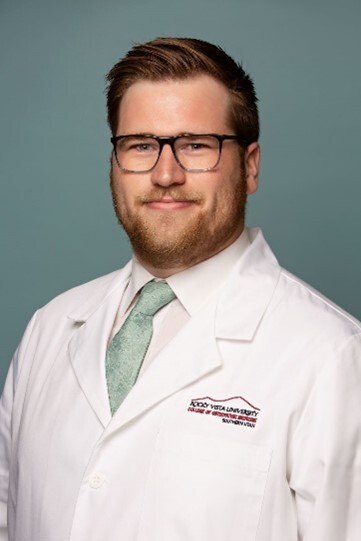
Austin White
Medical Student
Austin B. White is a student at Rocky Vista University College of Osteopathic Medicine – Southern Utah Campus. He graduated from Weber State University in Ogden, Utah with a BS in zoology. His interest in osteopathic medicine stems from a pursuit of non-pharmacological methods of pain management. As part of Rocky Vista University’s digital health track, he plans to investigate new applications of technology into family and psychiatric medicine. After graduating medical school, Austin plans to pursue a residency in family medicine.

Jasmine Yu
Medical Student
Jasmine Yu, MS is an OMS-II student at Rocky Vista University College of Osteopathic Medicine. She is part of the Digital Health Honors Track, the first and only longitudinal program dedicated to additional digital health training for student physicians. Prior to medical school, she received her master’s degree in biomedical science at Eastern Virginia Medical School. Her current research interests focus on improving medical education curriculum, enhancing student communication skills through improv, as well as evaluating substance use trends pre- and peri- COVID.
-
Register
- Non-member - Free!
- Member - Free!
- Resident/Fellow - Free!
- Student - Free!
- More Information
-
Contains 3 Component(s)
Note: This education in not intended for any type of board certification but is instead as a supplemental education. By the end of this module, you should be able to: • Understand the scope and limitations of digital medicine tools • Recognize best practices for selecting digital medicine tools • Identify how the data is acquired from digital medicine tools • Considerate how to turn data into actionable insights
Note: This education in not intended for any type of board certification but is instead as a supplemental education.
Thank you for registering for Digital Health for Practicing Clinicians: A Certificate Program. The Digital Medicine Society (DiMe) and Rocky Vista University College of Osteopathic Medicine - Digital Health Track (RVU-DHT), in collaboration with the American College of Osteopathic Family Physicians (ACOFP), has developed foundational educational content for the current and future practicing clinicians who provide exceptional care in the digital era of healthcare. Content creation was jointly guided by DiMe and RVU faculty and researched by students at RVU-DHT as some of the first physicians trained specifically in digital health.
Program Details
The Digital Medicine Society (DiMe) and Rocky Vista University College of Osteopathic Medicine - Digital Health Track (RVU-DHT) are partnering to develop foundational educational content for practicing clinicians towards providing exceptional care in the digital era of healthcare. Content creation is jointly guided by DiMe and RVU faculty and researched by students at RVU-DHT as some of the first physicians trained specifically in digital health.
The course will feature 8 modules, each with a pre- and post-test, as well as a final exam to test your knowledge and competency at the end of the course. The entire course, including the final exam, has 5.00 AOA Category 1-A CME available. Each module is expected to take around 30-40 minutes to complete for a total of approximately 5 contact hours plus the final exam.
You will repeat this for all 8 modules. Once you have completed all 8, you will have access to a comprehensive final exam covering content from all 8 modules. You must get a 70% or higher on this exam to obtain your certificate, and you will have three attempts. After successfully completing the exam, you will receive your certificate and access to various references and resources.
Module 2: Evaluating Frameworks for Selecting Digital Technologies for Patients and Clinics
Dr. Cole Zanetti, DO, MPH, Dr. Regan A. Stiegmann, DO, MPH and Dr. Smit Patel, PharmD along with Ali Coffee (Koehler), Jackson Holmgren, Meghana Kethirredy, and Matthew Tepper
By the end of this module, you should be able to:
- Understand the scope and limitations of digital medicine tools
- Recognize best practices for selecting digital medicine tools
- Identify how the data is acquired from digital medicine tools
- Considerate how to turn data into actionable insights

Cole A. Zanetti DO, MPH
Co-Director
Director of the Digital Health Track
Rocky Vista University
College of Osteopathic Medicine
Disclosures:
None

Regan A. Stiegmann DO, MPH
Co-Director
Co-Director of the Digital Health Track
Rocky Vista University
College of Osteopathic Medicine
Disclosures:
None

Smit Patel, PharmD
Director of Digital Medicine
Disclosures:
None

Ali Koehler Coffee
Medical Student
Ali Koehler Coffee is a third-year medical student at Rocky Vista College of Osteopathic Medicine (RVUCOM). She graduated from Saint Martin’s University in Lacey, Washington with a Bachelor of Science in Chemistry where she was a dual-sport Division II athlete in soccer and golf. Prior to medical school, Ali worked at PRA Health Sciences as medical research assistant and volunteered at her hometown’s free medical clinic. She is a member of the RVUCOM Digital Health track, a member of the American College of Pediatrics, and a member of the American College of Lifestyle Medicine. Her academic interests include educating and motivating patients to take control of their health through healthy lifestyle choices such as diet, exercise, stress reduction and utilizing digital medicine technologies to benefit physicians and improve patient care.

Jackson Holmgren
Medical Student
Jackson is a medical student at Rocky Vista University College of Osteopathic Medicine-Southern Utah Campus.
His is originally from Kansas and his hobbies include fly fishing, mountain bike riding, backpacking, and photography. Professionally, Jackson is interested in various medical specialties and look forward to continuing his education.
He has a large interest in the world of Digital Medicine. Jackson is specifically interested in the field of Clinical Informatics and how utilizing novel digital medicine technologies can improve access to care in rural setting.

Meghana Kethireddy
Medical Student
Meghana Kethireddy is a second-year medical student at Rocky Vista University College of Osteopathic Medicine (RVUCOM). She graduated from Nova Southeastern University in Fort Lauderdale, Florida with a Bachelor of Science in Biology. During her undergraduate career she served as a student research assistant at the Rumbaugh-Goodwin Institute for Cancer Research and presented research at the Life Sciences STEM Regional Conference. She is a member of RVUCOM’s Digital Health track and a member of the American College of Physicians (ACP). Her current interests in the realm of digital health include the advancement of clinical informatics to improve physician efficiency and patient outcomes as well as measuring the efficacy of wearables to provide patients with more control of their health. Apart from Digital health, her academic interests include internal medicine and ultrasonography.

Matthew Tepper
Medical Student
Matt Tepper is originally from Philadelphia, PA. He graduated from Ohio State University in 2018 with a degree in economics and a minor in biology. During his time at college, Matt interned at a health technology start up in Tel Aviv, which introduced him to the field of digital health. Matt is currently a medical student at Rocky Vista University College of Osteopathic Medicine class of 2024 in the digital health track. While he is still undecided on a specialty, Matt plans to incorporate his knowledge of digital health into whichever route he pursues. When he is not studying, Matt enjoys skiing and rooting for Philadelphia and Ohio State sports teams.
-
Register
- Non-member - Free!
- Member - Free!
- Resident/Fellow - Free!
- Student - Free!
- More Information
-
Contains 7 Component(s), Includes Credits
Note: This education in not intended for any type of board certification but is instead as a supplemental education. By the end of this module, you should be able to: • Identify digital health technologies that are relevant to your patients • Use data from digital health technologies to inform care • Redesign workflows to improve care, efficiency, and patient and clinician experience
Note: This education in not intended for any type of board certification but is instead as a supplemental education.
Thank you for registering for Digital Health for Practicing Clinicians: A Certificate Program. The Digital Medicine Society (DiMe) and Rocky Vista University College of Osteopathic Medicine - Digital Health Track (RVU-DHT), in collaboration with the American College of Osteopathic Family Physicians (ACOFP), has developed foundational educational content for the current and future practicing clinicians who provide exceptional care in the digital era of healthcare. Content creation was jointly guided by DiMe and RVU faculty and researched by students at RVU-DHT as some of the first physicians trained specifically in digital health.
Program Details
The Digital Medicine Society (DiMe) and Rocky Vista University College of Osteopathic Medicine - Digital Health Track (RVU-DHT) are partnering to develop foundational educational content for practicing clinicians towards providing exceptional care in the digital era of healthcare. Content creation is jointly guided by DiMe and RVU faculty and researched by students at RVU-DHT as some of the first physicians trained specifically in digital health.
The course will feature 8 modules, each with a pre- and post-test, as well as a final exam to test your knowledge and competency at the end of the course. The entire course, including the final exam, has 5.00 AOA Category 1-A CME available. Each module is expected to take around 30-40 minutes to complete for a total of approximately 5 contact hours plus the final exam.
You will repeat this for all 8 modules. Once you have completed all 8, you will have access to a comprehensive final exam covering content from all 8 modules. You must get a 70% or higher on this exam to obtain your certificate, and you will have three attempts. After successfully completing the exam, you will receive your certificate and access to various references and resources.
Module 8: Integration of Digital Health Technology into Clinical Care
Dr. Cole Zanetti, DO, MPH, Dr. Regan A. Stiegmann, DO, MPH and Dr. Smit Patel, PharmD along with Austin B. White, Kenny Ta, Kamaehu Matthias, Jason Steele, and Robert Cameron Green
By the end of this module, you should be able to:
- Identify digital health technologies that are relevant to your patients
- Use data from digital health technologies to inform care
- Redesign workflows to improve care, efficiency, and patient and clinician experience

Cole A. Zanetti DO, MPH
Co-Director
Director of the Digital Health Track
Rocky Vista University
College of Osteopathic Medicine
Disclosures:
None

Regan A. Stiegmann DO, MPH
Co-Director
Co-Director of the Digital Health Track
Rocky Vista University
College of Osteopathic Medicine
Disclosures:
None

Smit Patel, PharmD
Director of Digital Medicine
Disclosures:
None

Austin B. White
Medical Student
Austin B. White is a student at Rocky Vista University College of Osteopathic Medicine – Southern Utah Campus. He graduated from Weber State University in Ogden, Utah with a BS in zoology. His interest in osteopathic medicine stems from a pursuit of non-pharmacological methods of pain management. As part of Rocky Vista University’s digital health track, he plans to investigate new applications of technology into family and psychiatric medicine. After graduating medical school, Austin plans to pursue a residency in family medicine.

Kenny Ta
Medical Student
Kenny Ta, born in 1994, graduated from the University of Texas at Dallas with a BS in Biology. He is now a student at Rocky Vista University College of Osteopathic Medicine – Colorado, class of 2024. Kenny's interest in computer science and ultrasound technology led him to join the Digital Health Track, the first 4-year program of its kind offered by a United States medical school. After graduating, Kenny plans to pursue a residency in Emergency Medicine and a fellowship in Critical Care.

Kamaehu Matthias
Medical Student
Kamaehu Matthias is a student from Rocky Vista University College of Osteopathic Medicine – Southern Utah. He graduated from Utah State University with a BS in Biology. His interest in digital health stems from his undergraduate research in leveraging mobile technologies in learning environments. The Digital Health Track at RVU has offered him a new approach to technology and how it can improve patient outcomes while also offering providers a new tool to improve workflow efficiency. He is pursuing a career in sports medicine and is excited to bring an informed perspective and acceptance of digital health technologies into everyday practice.

Jason Steele
Medical Student
Jason L. Steele was born and raised in Salt Lake City, Utah, and since then has lived in Ecuador, Virginia, Texas, and now St. George, Utah. He graduated from Brigham Young University – Provo, with a Bachelor of Science in Neuroscience with a dual major in Spanish Studies. Shortly after graduating, he received his Certified Healthcare Interpreter™ credential for the Spanish language.
Currently, he is a medical student at Rocky Vista University College of Osteopathic Medicine (RVUCOM) – Southern Utah Campus.
As a member of RVUCOM’s Digital Health Track, Jason is establishing himself with a focus in the medical application of artificial intelligence, machine learning, and data analytics. He plans to incorporate these learned skills and interests throughout his medical training. Upon graduating from medical school, he plans to pursue a career in Otolaryngology.
Jason is active in various sporting and recreational activities including biking, playing soccer, and spending time outdoors with his wife and children.

Robert Cameron Green
Medical Student
-
Register
- Non-member - Free!
- Member - Free!
- Resident/Fellow - Free!
- Student - Free!
- More Information
-
Contains 9 Product(s)
The Digital Medicine Society (DiMe) and Rocky Vista University College of Osteopathic Medicine - Digital Health Track (RVU-DHT) are partnering to develop foundational educational content for practicing clinicians towards providing exceptional care in the digital era of healthcare. Content creation is jointly guided by DiMe and RVU faculty and researched by students at RVU-DHT as some of the first physicians trained specifically in digital health. The course will feature 8 modules, each with a pre- and post-test, as well as a final exam to test your knowledge and competency at the end of the course. The entire course, including the final exam, has 5.00 AOA Category 1-A CME available. Each module is expected to take around 30-40 minutes to complete for a total of approximately 5 contact hours plus the final exam. You will repeat this for all 8 modules. Once you have completed all 8, you will have access to a comprehensive final exam covering content from all 8 modules. You must get a 70% or higher on this exam to obtain your certificate, and you will have three attempts. After successfully completing the exam, you will receive your certificate and access to various references and resources.
The Digital Medicine Society (DiMe) and Rocky Vista University College of Osteopathic Medicine - Digital Health Track (RVU-DHT), in collaboration with the American College of Osteopathic Family Physicians (ACOFP), has developed foundational educational content for the current and future practicing clinicians who provide exceptional care in the digital era of healthcare. Content creation was jointly guided by DiMe and RVU faculty and researched by students at RVU-DHT as some of the first physicians trained specifically in digital health. The course features eight modules, each with a pre- and post-test, as well as a final exam to test your knowledge and competency at the end of the course. Each module is expected to take around 30–40 minutes to complete for a total of approximately five contact hours plus the final exam. The eight modules consist of:
- Introduction to Digital Health
- Evaluative Frameworks for Selecting Technology for Patients and Clinics
- Best Practices for Telemedicine
- Artificial Intelligence in Healthcare
- Consumer Health Informatics
- Patient Advocacy in Digital Health
- Health Equity and Ethics in the Digital Age
- Integration Digital Health Technologies into Clinical Care
Learning Objectives
Upon the successful completion of this eight-part course, learners will:
- Obtain an overview of digital health and understand the differences between digital health, digital medicine, and digital therapeutics.
- See how new, patient-centered approaches to evaluating digital health products can lead to safe, effective, equitable, and ethical patient care.
- Understand the changing roles of clinicians with technology and how digital medicine tools can support the evolving future of healthcare.
- Realize new opportunities for efficiently acquiring new skills and incorporating “digital” into patient care.
- Learn best practices for how to integrate digital medicine and digital therapeutic products into real-life clinical settings.
Audience
The target audience for the certificate program is current or future healthcare professionals interested in expanding their knowledge of using digital health in a clinical care and practice setting. This course will also be of interest to those individuals who are involved with patient care, including but not limited to nurse practitioners, registered nurses, pharmacists, physician assistants, and licensed social workers.
Pricing
- Member: $150
- Non-member: $250
Program Details
The Digital Medicine Society (DiMe) and Rocky Vista University College of Osteopathic Medicine - Digital Health Track (RVU-DHT) are partnering to develop foundational educational content for practicing clinicians towards providing exceptional care in the digital era of healthcare. Content creation is jointly guided by DiMe and RVU faculty and researched by students at RVU-DHT as some of the first physicians trained specifically in digital health. The course will feature 8 modules, each with a pre- and post-test, as well as a final exam to test your knowledge and competency at the end of the course. The entire course, including the final exam, has 5.00 AOA Category 1-A CME available. Each module is expected to take around 30-40 minutes to complete for a total of approximately 5 contact hours plus the final exam. You will repeat this for all 8 modules. Once you have completed all 8, you will have access to a comprehensive final exam covering content from all 8 modules. You must get a 70% or higher on this exam to obtain your certificate, and you will have three attempts. After successfully completing the exam, you will receive your certificate and access to various references and resources.
Statement of Independence
As a provider of CME accredited by the Accreditation Council for Continuing Medical Education, The Digital Medicine Society and Rocky Vista University College of Osteopathic Medicine - Digital Health Track (RVU-DHT) has a policy of ensuring that the content and quality of this educational activity are balanced, independent, objective, and scientifically rigorous. The scientific content of this activity was developed under the supervision of The Digital Medicine Society and Rocky Vista University College of Medicine - Digital Health Track (RVU-DHT) faculty members. This program is sponsored by ACOFP for educational purposes only. The material presented is not intended to represent the sole or best medical interventions for the discussed diagnosis but rather is intended to present the opinions of the authors or presenters that may be helpful to other practitioners. Attendees participating in this medical education program do so with the full knowledge that they waive any claim they may have against ACOFP for reliance on any information presented during these educational activities.
Disclaimers
The American College of Osteopathic Family Physicians (ACOFP) online education is an educational resource and as such does not define a standard of care, nor is it intended to dictate an exclusive course of treatment or procedure to be followed. It presents methods and techniques of clinical practice that are acceptable and used by recognized authorities, for consideration by licensed physicians and healthcare providers to incorporate into their practice. Variations of practice, taking into account the needs of the individual patient, resources, and limitation unique to the institution or type of practice, may be appropriate.
The statements and opinions expressed within this educational program are those of the faculty and not necessarily those of the ACOFP. The ACOFP disclaims any responsibility and/or liability for such information.
Faculty Disclosure Policies
It is the policy of the American College of Osteopathic Family Physicians (ACOFP) to ensure balance, independence, objectivity, and scientific rigor in all its individually sponsored or jointly sponsored educational programs. All faculty participating in any ACOFP sponsored programs are expected to disclose to the program audience any real or apparent conflict(s) of interest that may have a direct bearing on the subject matter of the continuing education program. This pertains to relationships with pharmaceutical companies, biomedical device manufacturers, or other corporations whose products or services are related to the subject matter of the presentation topic. The intent of this policy is not to prevent a speaker with a potential conflict of interest from making a presentation. It is merely intended that any potential conflict should be identified openly so that the listeners may form their own judgments about the presentation with the full disclosure of the facts. It remains for the audience to determine whether the speaker's outside interests may reflect a possible bias in either the exposition or the conclusions presented.
The faculty, committee members, and staff who are in position to control the content of this activity are required to disclose to The Digital Medicine Society and Rocky Vista University College of Osteopathic Medicine - Digital Health Track (RVU-DHT) to learners any relevant financial relationship(s) of the individual or spouse/partner that have occurred within the last 24 months with any commercial interest(s) whose products or services are related to the content. Financial relationships are defined by remuneration in any amount from the commercial interest(s) in the form of grants; research support; consulting fees; salary; ownership interest (e.g., stocks, stock options, or ownership interest excluding diversified mutual funds); honoraria or other payments for participation in speakers' bureaus, advisory boards, or boards of directors; or other financial benefits. The intent of this disclosure is not to prevent planners with relevant financial relationships from planning or delivery of content, but rather to provide learners with information that allows them to make their own judgments of whether these financial relationships may have influenced the educational activity with regard to exposition or conclusion.
The following faculty reported relevant financial relationships: None to report. The following faculty reported no relevant financial relationships: Cole Zanetti, DO, MPH. Regan Stiegmann, DO. Dr. Smit Patel, PharmD — Director of Digital Medicine. The American College of Osteopathic Family Physicians (ACOFP) and The Digital Medicine Society and Rocky Vista University College of Osteopathic Medicine staff associated with the development of this CME activity reported no relevant financial relationships. The American College of Osteopathic Family Physicians (ACOFP) and The Digital Medicine Society and Rocky Vista University College of Osteopathic Medicine staff have reviewed all disclosures and resolved or managed all relevant identified conflicts of interest, as applicable.
ACKNOWLEDGMENT OF COMMERCIAL SUPPORT
This activity is not supported by educational grant(s) or other funds from any commercial supporter.
MEET THE FACULTY AND STUDENTS

Cole A. Zanetti DO, MPH
— Co-Director
Director of the Digital Health Track
Rocky Vista University
College of Osteopathic Medicine
Disclosures: none
Regan A. Stiegmann DO, MPH
— Co-Director
Co-Director of the Digital Health Track
Rocky Vista University
College of Osteopathic Medicine
Disclosures: none
Ali Koehler Coffee — Medical Student
Ali Koehler Coffee is a third-year medical student at Rocky Vista College of Osteopathic Medicine(RVUCOM). She graduated from Saint Martin’s University in Lacey, Washington with a Bachelor of Science in Chemistry where she was a dual-sport Division II athlete in soccer and golf. Prior to medical school, Ali worked at PRA Health Sciences as medical research assistant and volunteered at her hometown’s free medical clinic. She is a member of the RVUCOM Digital Health track, a member of the American College of Pediatrics, and a member of the American College of Lifestyle Medicine. Her academic interests include educating and motivating patients to take control of their health through healthy lifestyle choices such as diet, exercise, stress reduction and utilizing digital medicine technologies to benefit physicians and improve patient care.
Jackson Holmgren — Medical Student
Jackson is a medical student at Rocky Vista University College of Osteopathic Medicine-Southern Utah Campus.
His is originally from Kansas and his hobbies include fly fishing, mountain bike riding, backpacking, and photography. Professionally, Jackson is interested in various medical specialties and look forward to continuing his education.
He has a large interest in the world of Digital Medicine. Jackson is specifically interested in the field of Clinical Informatics and how utilizing novel digital medicine technologies can improve access to care in rural setting.
Meghana Kethireddy — Medical Student
Meghana Kethireddy is a second year medical student at Rocky Vista University College of Osteopathic Medicine (RVUCOM). She graduated from Nova Southeastern University in Fort Lauderdale, Florida with a Bachelor of Science in Biology. During her undergraduate career she served as a student research assistant at the Rumbaugh-Goodwin Institute for Cancer Research and presented research at the Life Sciences STEM Regional Conference. She is a member of RVUCOM’s Digital Health track and a member of the American College of Physicians (ACP). Her current interests in the realm of digital health include, the advancement of clinical informatics to improve physician efficiency and patient outcomes as well as measuring the efficacy of wearables to provide patients with more control of their health. Apart from Digital health, her academic interests include internal medicine and ultrasonography.Robert Cameron Green — Medical Student 
Anjali Patel — Medical Student
Anjali Patel (she/her) is originally from Evansville, IN and moved to Colorado in 2019 to pursue a Masters in Biomedical Sciences at Rocky Vista University College of Osteopathic Medicine. She is currently a 2nd year medical student at RVU-COM, where she is a proud member of the Digital Health Track. Anjali has served as Vice President of the American Medical Women’s Association and as the Community Service chair for the American College of Osteopathic Pediatricians clubs during her time at RVU. Additionally, she works as an anatomy lab tutor for 1st year students and is a member of Sigma Sigma Phi Osteopathic Medical Honor society. In her free time, she enjoys hiking and going to concerts!
Amy Pham — Medical Student
Amy Pham is a current second-year medical student at Rocky Vista University. Originally from Wichita, KS she graduated with honors from Wichita State University with a BS in Chemistry and BA in French in 2019, and from Colorado State University with an MS in Biomedical Sciences in 2020. Amy represents Rocky Vista University as part of the Class of 2024 cohort of the Digital Health Honors Track and has been engaged with first-year medical students as a tutor in the cardiovascular and neuroscience systems courses. She can speak 3 languages and enjoys spending her free time learning new languages and “traveling from home” by immersing herself in foreign film, music and literature, and cooking dishes from around the world.
Sofia Rahmanzai — Medical Student
Sofia Rahmanzai (she/her) is originally from Omaha, Nebraska, where she gained her BS in Biotechnology at the University of Nebraska. She moved to Colorado in 2019 to attend Rocky Vista University’s Master of Biomedical Sciences, followed by the College of Osteopathic Medical Program. In her second year of medical school, Sofia stays busy with the Digital Health Track, the Physical Medicine and Rehabilitation Club as a secretary, and various volunteer opportunities including administering COVID vaccines at the RVU clinic. Some of Sofia’s interests include playing volleyball, weekend trips, and designing a digital health tool app with her DHT colleagues.
Kendrick Rubino — Medical Student
Kendrick Rubino is from New Hampshire, and is currently a second-year medical student at Rocky Vista University out in Colorado. Kendrick is also part of my medical school's digital health track which is the first program of its kind to be implemented into a medical school's curriculum. Kendrick joined this track because he believes Digital Health is the future of medicine and can have far reaching positive impacts in our health care systems and with our patients.
Samantha Santora — Medical Student
Samantha Santora is a second-year medical student at Rocky Vista University College of Osteopathic Medicine. She graduated from University of North Texas Honors College with a Bachelor’s of Art in Biology with a dual minor in Chemistry and Psychology. She previously completed her EMT certification and volunteered with her community’s free clinic, as well as volunteered within her local hospital’s Labor and Delivery ward. She currently is a member of the RVUCOM Digital Health Honors Track, member of the RVU Chapter of American College of Osteopathic Emergency Physicians, Co-President of the RVU chapter of Colorado Medical Society, and Community Outreach Coordinator for the RVU chapter of American College of Osteopathic Surgeons-Medical Student Section. Her academic interests include committing to lifelong education, mentoring medical and pre-medical students, ensuring quality, accessible care for all, and utilizing digital medicine technologies to benefit physicians and improve patient care.
Jason Steele — Medical Student
Jason L. Steele was born and raised in Salt Lake City, Utah, and since then has lived in Ecuador, Virginia, Texas, and now St. George, Utah. He graduated from Brigham Young University – Provo, with a Bachelor of Science in Neuroscience with a dual major in Spanish Studies. Shortly after graduating, he received his Certified Healthcare Interpreter™ credential for the Spanish language.
Currently, he is a medical student at Rocky Vista University College of Osteopathic Medicine (RVUCOM) – Southern Utah Campus.
As a member of RVUCOM’s Digital Health Track, Jason is establishing himself with a focus in the medical application of artificial intelligence, machine learning, and data analytics. He plans to incorporate these learned skills and interests throughout his medical training. Upon graduating from medical school, he plans to pursue a career in Otolaryngology.
Jason is active in various sporting and recreational activities including biking, playing soccer, and spending time outdoors with his wife and children.
Kenny Ta — Medical Student
Kenny Ta, born in 1994, graduated from the University of Texas at Dallas with a BS in Biology. He is now a student at Rocky Vista University College of Osteopathic Medicine – Colorado, class of 2024. Kenny's interest in computer science and ultrasound technology led him to join the Digital Health Track, the first 4-year program of its kind offered by a United States medical school. After graduating, Kenny plans to pursue a residency in Emergency Medicine and a fellowship in Critical Care.
Matthew Tepper — Medical Student
Matt Tepper is originally from Philadelphia, PA. He graduated from The Ohio State University in 2018 with a degree in economics and a minor in biology. During his time at college, Matt interned at a health technology start up in Tel Aviv, which introduced him to the field of digital health. Matt is currently a medical student at Rocky Vista University College of Osteopathic Medicine class of 2024 in the digital health track. While he is still undecided on a specialty, Matt plans to incorporate his knowledge of digital health into whichever route he pursues. When he is not studying, Matt enjoys skiing and rooting for Philadelphia and Ohio State sports teams.
Danica Cecil Ujano — Medical Student
Danica Cecil Ujano is a student at Rocky Vista University College of Osteopathic Medicine in Colorado. She graduated with her BSN from Lewis University in 2015 and shortly after, obtained her license as a registered nurse. While providing care to diverse patient populations across the lifespan in the Chicago area, she explored her interest in clinical research and STEM. In 2019, she graduated with a BA in Biomedical Sciences at Lewis University. As part of the Digital Health Track at RVU, Danica Cecil is a co-author to continuing education modules, conference presentations, and research studies aimed at improving physician-patient communication in a digital era. After graduation, Danica Cecil hopes to pursue a career in radiology or clinical informatics with a focus on artificial intelligence technology and machine learning.
Austin B. White — Medical Student
Austin B. White is a student at Rocky Vista University College of Osteopathic Medicine – Southern Utah Campus. He graduated from Weber State University in Ogden, Utah with a BS in zoology. His interest in osteopathic medicine stems from a pursuit of non-pharmacological methods of pain management. As part of Rocky Vista University’s digital health track, he plans to investigate new applications of technology into family and psychiatric medicine. After graduating medical school, Austin plans to pursue a residency in family medicine.
Austin G. White — Medical Student
Austin G. White is a second year medical student at Rocky Vista University in Colorado. Austin studied Biochemistry in his undergraduate education and also obtained a Masters of Science in Biomedical Sciences before medical school. His interests include the implementation of digital medicine, family medicine, obstetrics and neonatal medicine. Austin participated in the DiMe CME module to further his understanding of how a working physician could use technology to improve patient outcomes.
Jasmine Yu — Medical Student
Jasmine Yu, MS is an OMS-II student at Rocky Vista University College of Osteopathic Medicine. She is part of the Digital Health Honors Track, the first and only longitudinal program dedicated to additional digital health training for student physicians. Prior to medical school, she received her Master’s Degree in Biomedical Science at Eastern Virginia Medical School. Her current research interests focus on improving medical education curriculum, enhancing student communication skills through improv, as well as evaluating substance use trends pre- and peri- COVID.
Kamaehu Matthias — Medical Student
Kamaehu Matthias is a student from Rocky Vista University College of Osteopathic Medicine – Southern Utah. He graduated from Utah State University with a BS in Biology. His interest in digital health stems from his undergraduate research in leveraging mobile technologies in learning environments. The Digital Health Track at RVU has offered him a new approach to technology and how it can improve patient outcomes while also offering providers a new tool to improve workflow efficiency. He is pursuing a career in sports medicine and is excited to bring an informed perspective and acceptance of digital health technologies into everyday practice.MEET THE REVIEWERS
Dr. Smith Patel, PharmD, - Director of Digital Medicine Dr. Michael Cooper, DO Dr. Robert Pedowitz, DO, FACOFP Dr. Linda F. Delo, DO, FACOFP Dr. Anastasia Marie Benson, DO Dr. Adam S. Cohen-Lewe, DO Dr. Eugene M. DiBetta Jr., DO Dr. Eric S. Felber, DO Dr. Steven R. Ferreira, DO Dr. Douglas W. Harley, DO FACOFP, FAAFP Dr. Jorge D. Luna, DO, FACOFP Dr. Ira P. Monka, DO, MHA, FACOFP Dr. Christopher B. Scuderi, DO Dr. Erika Marie Silberman, DO Dr. Roy P. Ward, DO, MHA Accreditation Statements
This activity has been planned and implemented in accordance with the accreditation requirements and policies of the Accreditation Council for Continuing Medical Education (ACCME) through the American College of Osteopathic Internists. The Endocrine Society is accredited by the ACCME to provide continuing medical education for physicians.

AMA PRA Category 1 Credit
The American College of Osteopathic Internists is accredited by the Accreditation Council for Continuing Medical Education to provide continuing medical education for physicians. ACOI designates this course for a maximum of 15.00 AMA PRA Category 1™ Credits. Physicians should claim only the credit commensurate with the extent of their participation in the activity. While offering CME credits noted above, this program is not intended to provide extensive training or certification in the field. Please note that while other accrediting bodies accept AMA PRA Category 1 credit, we can only award and report this credit for MDs/DOs. For those outside of this accreditation, please complete the participation evaluation and use that certificate as proof of attendance to submit to your accrediting body.
AOA Category 1-A Credit
The American College of Osteopathic Internists (ACOI) is accredited by the American Osteopathic Association (AOA) to provide osteopathic continuing medical education for physicians. ACOI designates this program for a maximum number of 15.00 AOA Category 1-A credits and will report CME with the extent of the physician’s participation in this activity. This program is sponsored by ACOI for educational purposes only.

Maintenance of Certification (MOC) - if eligible
Successful completion of each CME activity in this course, which includes participation in the evaluation component, enables the participant to earn up to 15.00 points in the American Board of Internal Medicine (ABIM) Maintenance of Certification (MOC) program. Participants will earn MOC points equivalent to the amount of CME credits claimed for the activity. It is the CME activity provider's responsibility to submit participant completion information to ACCME for the purpose of granting ABIM MOC credit.
For questions about content or obtaining CME credit, please contact the ACOI at education@acoi.org.
-
Register
- Non-member - $250
- Member - $150
- Resident/Fellow - Free!
- Student - Free!
- More Information
-
Contains 3 Component(s)
Note: This education in not intended for any type of board certification but is instead as a supplemental education. By the end of this module, you should be able to: • Identify the basics of digital health care tools • Understand clinical uses in patient practice • Recognize current barriers to digital health technology
Note: This education in not intended for any type of board certification but is instead as a supplemental education.
Thank you for registering for Digital Health for Practicing Clinicians: A Certificate Program. The Digital Medicine Society (DiMe) and Rocky Vista University College of Osteopathic Medicine - Digital Health Track (RVU-DHT), in collaboration with the American College of Osteopathic Family Physicians (ACOFP), has developed foundational educational content for the current and future practicing clinicians who provide exceptional care in the digital era of healthcare. Content creation was jointly guided by DiMe and RVU faculty and researched by students at RVU-DHT as some of the first physicians trained specifically in digital health.
Program Details
The Digital Medicine Society (DiMe) and Rocky Vista University College of Osteopathic Medicine - Digital Health Track (RVU-DHT) are partnering to develop foundational educational content for practicing clinicians towards providing exceptional care in the digital era of healthcare. Content creation is jointly guided by DiMe and RVU faculty and researched by students at RVU-DHT as some of the first physicians trained specifically in digital health.
The course will feature 8 modules, each with a pre- and post-test, as well as a final exam to test your knowledge and competency at the end of the course. The entire course, including the final exam, has 5.00 AOA Category 1-A CME available. Each module is expected to take around 30-40 minutes to complete for a total of approximately 5 contact hours plus the final exam.
You will repeat this for all 8 modules. Once you have completed all 8, you will have access to a comprehensive final exam covering content from all 8 modules. You must get a 70% or higher on this exam to obtain your certificate, and you will have three attempts. After successfully completing the exam, you will receive your certificate and access to various references and resources.
Module 1: Introduction to Digital Health
Dr. Cole Zanetti, DO, MPH, Dr. Regan A. Stiegmann, DO, MPH and Dr. Smit Patel, PharmD along with Anjali Patel, Amy Pham, Sofia Rahmanzai, and Kendrick Rubino
By the end of this module, you should be able to:
- Identify the basics of digital health care tools
- Understand clinical uses in patient practice
- Recognize current barriers to digital health technology

Cole A. Zanetti DO, MPH
Co-Director
Director of the Digital Health Track
Rocky Vista University
College of Osteopathic Medicine
Disclosures:
None

Regan A. Stiegmann DO, MPH
Co-Director
Co-Director of the Digital Health Track
Rocky Vista University
College of Osteopathic Medicine
Disclosures:
None

Smit Patel, PharmD
Director of Digital Medicine
Disclosures:
None

Anjali Patel
Medical Student
Anjali Patel (she/her) is originally from Evansville, IN and moved to Colorado in 2019 to pursue a master's in biomedical sciences at Rocky Vista University College of Osteopathic Medicine. She is currently a 2nd year medical student at RVU-COM, where she is a proud member of the Digital Health Track. Anjali has served as Vice President of the American Medical Women’s Association and as the Community Service chair for the American College of Osteopathic Pediatricians clubs during her time at RVU. Additionally, she works as an anatomy lab tutor for 1st year students and is a member of Sigma Sigma Phi Osteopathic Medical Honor society. In her free time, she enjoys hiking and going to concerts

Amy Pham
Medical Student
Amy Pham is a current second-year medical student at Rocky Vista University. Originally from Wichita, KS she graduated with honors from Wichita State University with a BS in Chemistry and BA in French in 2019, and from Colorado State University with an MS in Biomedical Sciences in 2020. Amy represents Rocky Vista University as part of the Class of 2024 cohort of the Digital Health Honors Track and has been engaged with first-year medical students as a tutor in the cardiovascular and neuroscience systems courses. She can speak 3 languages and enjoys spending her free time learning new languages and “traveling from home” by immersing herself in foreign film, music and literature, and cooking dishes from around the world.

Sofia Rahmanzai
Medical Student
Sofia Rahmanzai (she/her) is originally from Omaha, Nebraska, where she gained her BS in Biotechnology at the University of Nebraska. She moved to Colorado in 2019 to attend Rocky Vista University’s Master of Biomedical Sciences, followed by the College of Osteopathic Medical Program. In her second year of medical school, Sofia stays busy with the Digital Health Track, the Physical Medicine and Rehabilitation Club as a secretary, and various volunteer opportunities including administering COVID vaccines at the RVU clinic. Some of Sofia’s interests include playing volleyball, weekend trips, and designing a digital health tool app with her DHT colleagues.

Kendrick Rubino
Medical Student
Kendrick Rubino is from New Hampshire and is currently a second-year medical student at Rocky Vista University out in Colorado. Kendrick is also part of my medical school's digital health track which is the first program of its kind to be implemented into a medical school's curriculum. Kendrick joined this track because he believes Digital Health is the future of medicine and can have far reaching positive impacts in our health care systems and with our patients.
-
Register
- Non-member - Free!
- Member - Free!
- Resident/Fellow - Free!
- Student - Free!
- More Information
-
Contains 1 Component(s)
Note: This education in not intended for any type of board certification but is instead as a supplemental education. Thank you for registering for Digital Health for Practicing Clinicians: A Certificate Program. The Digital Medicine Society (DiMe) and Rocky Vista University College of Osteopathic Medicine - Digital Health Track (RVU-DHT), in collaboration with the American College of Osteopathic Family Physicians (ACOFP), has developed foundational educational content for the current and future practicing clinicians who provide exceptional care in the digital era of healthcare. Content creation was jointly guided by DiMe and RVU faculty and researched by students at RVU-DHT as some of the first physicians trained specifically in digital health. Before we begin with education content, please complete this brief survey.
Note: This education in not intended for any type of board certification but is instead as a supplemental education.
Thank you for registering for Digital Health for Practicing Clinicians: A Certificate Program. The Digital Medicine Society (DiMe) and Rocky Vista University College of Osteopathic Medicine - Digital Health Track (RVU-DHT), in collaboration with the American College of Osteopathic Family Physicians (ACOFP), has developed foundational educational content for the current and future practicing clinicians who provide exceptional care in the digital era of healthcare. Content creation was jointly guided by DiMe and RVU faculty and researched by students at RVU-DHT as some of the first physicians trained specifically in digital health.
Before we begin with education content, please complete this brief survey.
-
Register
- Non-member - Free!
- Member - Free!
- Resident/Fellow - Free!
- Student - Free!
- More Information
-
Register
